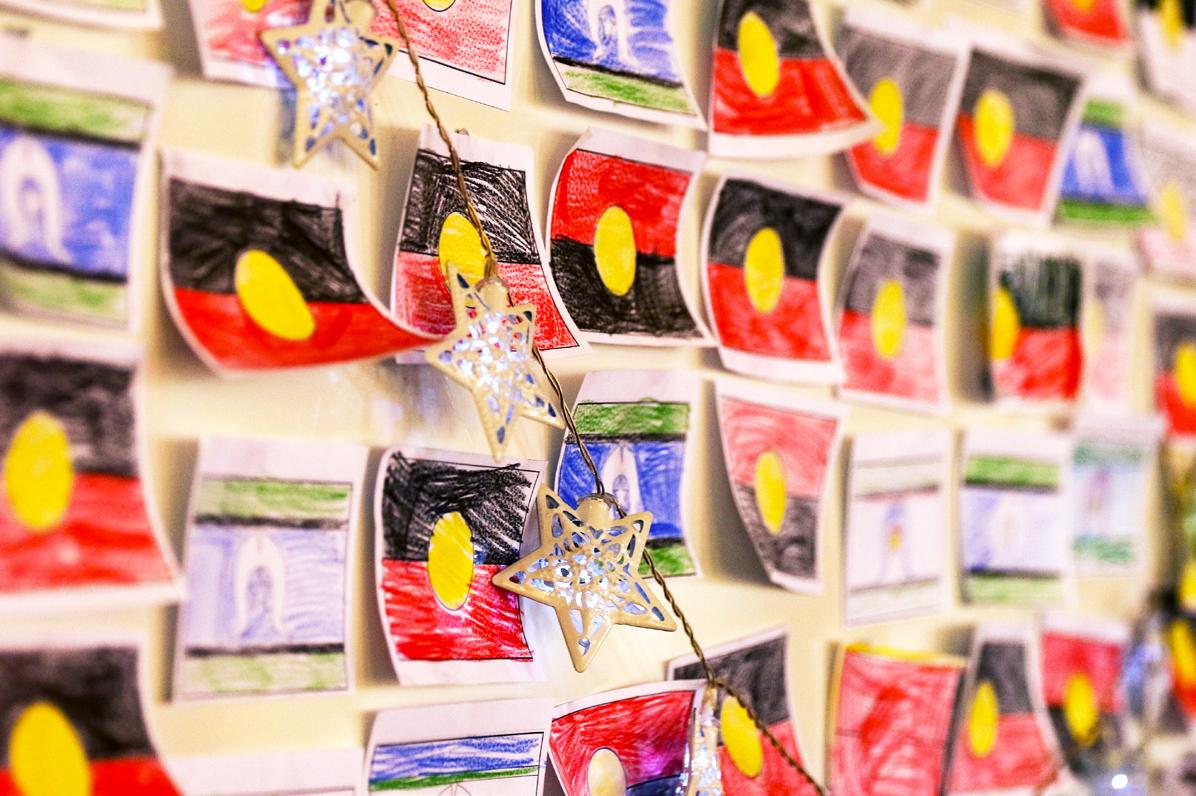
64 minute read
Reconciliation Prayer Space
St Margaret’s Anglican Girls School, QLD St Margaret’s Anglican Girls School fosters spirituality in students, giving them opportunities to explore their faith and the spirit of love through example, compassion, hope and charity.
In recent years, prayer spaces have provided opportunities for St Margaret’s students of all ages to explore spirituality and faith in a creative and engaging way.
School Chaplain, The Reverend Susan CrothersRobertson, said prayer spaces were an interactive environment where students could experience a practical, creative, reflective and inclusive space that helped them to express their own concerns, hopes, reflections or prayers.
“In prayer spaces, students are encouraged to pray, reflect or think about things in their own lives, and to reflect about others, the world and their relationship with God,” Reverend Susan said.
In May, coinciding with the start of National Reconciliation Week, St Margaret’s primary students in Pre-Prep to Year 6 were invited to participate in a Reconciliation Prayer Space – Dadirri. Reverend Susan and St Aidan’s Chaplain, The Reverend Gillian Moses and is based on the story of Thomas Pamphlet who was a convict and a castaway on Moreton Bay. Thomas and fellow convicts escaped and were cared for by the Quandamooka people at Amity on Minjerribah (Stradbroke Island). If it were not for their care, the convicts would probably not have survived.
Reverend Susan said she hoped students would gain a greater understanding and appreciation of Aboriginal and Torres Strait Islander culture and history through the themed Prayer Space.
“Each station encouraged students to reflect and think about various aspects of their culture and at the same time touched on the story of the convict Pamphlet,” Reverend Susan said.
Students journeyed through eight interactive and engaging prayer stations: Peace Fish, Message Sticks, Bark Canoe, Rainbow Serpent, Neighbours on this Red Earth, The Journey, Telling our Story, and Dreaming.
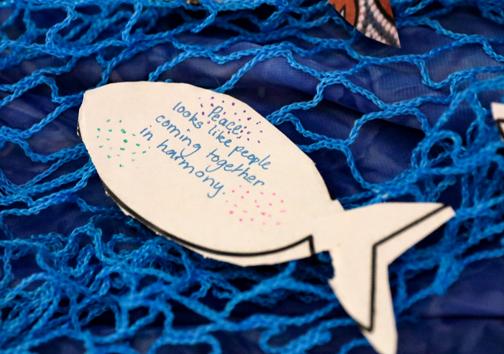
The Peace Fish station was an opportunity for students to reflect on peace-making inspired by John 14.27: Jesus said, “I give you peace, the kind of peace that only I can give. It isn’t like the peace that this world can give. So don’t be worried or afraid.” Students were encouraged to write or draw their reflections on a paper fish before setting it to ‘swim’ in the peace river.
One student wrote: “Peace looks like people coming together in harmony.”
The Message Stick station was an adaptation on this ancient form of communication used by the Aboriginal people. Students were asked to leave a message for God on a stick and place it in a sand tray. Many of the messages students wrote focused on kindness and courage. Here are just some the students left in the sand:
At the Bark Canoe station, students were invited to think about the Torres Strait and Aboriginal culture and their hopes and dreams for the future before writing their thoughts on little canoes and setting them to ‘sail’ in the river. “Make the world a better place”, “Help everyone be kind” and “I wish that world peace will come” were some of the reflections shared.
The Prayer Spaces provided an ideal platform for students to express and explore their feelings, concerns and wonders as well as consider others during Reconciliation Week, when all Australians are working to strengthen the relationships between Aboriginal and Torres Strait Islander peoples and nonIndigenous peoples. The decision to move to the regions was an easy one for new Bunbury Cathedral Grammar School Head of School Matthew O’Brien. Growing up in a regional environment, Mr O’Brien was keen to move his family back to a regional town.
“My wife and I actually did not really enjoy living in the city, so we decided to move to a regional area and commute to the city for work. I really liked working at high level schools within the city environment, so we were looking for that match of a citystyle school within a regional setting,” he said.
“When we first visited Bunbury Cathedral Grammar School, we thought, ‘Wow! This is exactly what we have been after.’ It is that academic pathway focussed, opportunity-rich school that is available within the regional setting – it is a win-win.”
Mr O’Brien joined BCGS in 2016 as the Head of Secondary, with a career of more than 20 years in teaching. Prior to BCGS, Mr O’Brien spent 12 years at Brisbane Boys College where he held numerous roles including Head of Science, Director of Studies and Head of Strategic Planning.
Mr O’Brien highlights said it was the campus, students and staff that made the School so special.
“We have the bush environment which we know is fantastic for the wellbeing of everybody and we have access to the coast. As far as campuses goes, we are just so lucky,” he said.
“Our students, they are just so real. That is what I love about regional kids – they have an honest and genuine nature, and they have a ‘go getter’ attitude which is what the School is all about.”
Mr O’Brien said he was excited to be leading the School as it starts implementing the new Master Plan, ensuring students continue to have access to modern educational facilities.
“The vision for over the next few years is to cement our position within the South West as the school of choice, offering the best opportunities and pathways for students of the region” he said.
“The Master Plan will see some great additions to our Arts Department, expansions of our Technology facilities providing more opportunity for hands-on metal and woodwork and begins the updates to our Boarding precinct, providing more recreational space for our Boarders.”


“Be happy and enjoy”
“You can do it”


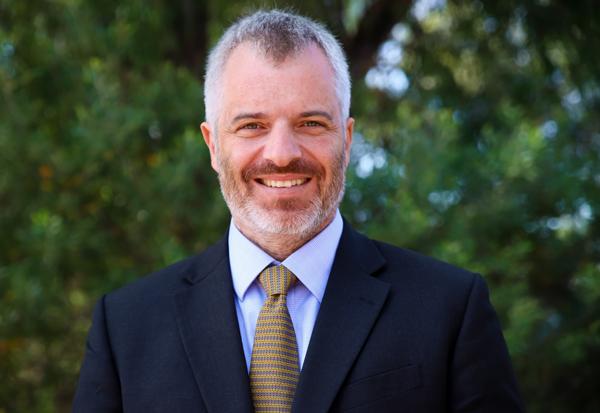
New Head of School
Bunbury Cathedral Grammar School, WA

Chaplain’s Column Foundational Faith
By The Reverend Matt Shorten One of the joys of having served as a chaplain on the ASA Management Committee for almost six years is hearing the faith stories. Each member of the committee brings not just their own faith story, but also the collective faith story of their school.
It is the hearing of these stories from across our country, as committee members shared deeply of themselves, that I will miss the most as I hand on the role of chaplain. I have been greatly enriched by the generosity shown me by this wonderful collection of principals, clergy and administrative legends. Thank you for seasoning my life!
Further to this, it has been an honour to chair the ASA Chaplain’s Consultative Committee which the Management Committee established to resource and review chaplaincy across Australia’s Anglican schools. Meeting with such passionate chaplains from a variety of flavours of Anglicanism has been a reminder that what we see as difference can actually unite us. I will truly miss the collegiality this group of chaplains brought to the table. They have strengthened my faith that Anglican schools will be communities where foundational faith formation will be happening for years to come.
So, what does foundational faith formation look like. To answer this, I want to share with you something our school, Lakes Grammar, has taken on this year. We have been trying to encapsulate what a Lakes Grammar graduate will look like in terms of character and so our Vital Framework was born. It has five key characteristics that we see as vital to shaping the character of our students. Amazingly, Vital is not an acronym…who knew, schools could name something without churning out an acronym!
The initial task force involved our Director of Teaching and Learning, our Director of Student Wellbeing and myself as chaplain brainstorming. We began a process of discernment together in communication with our principal and our first characteristic to emerge was that of ‘Faithful’.
We wanted our students to be faithful and this would be apparent by any one of the following demonstrable outcomes. Our students would love God and neighbour. They would develop respectful relationships, connect with school, community and beyond. Our students would serve others both near and far as well as care for our world. These are obviously aspirational and require our faith and efforts to be achieved. What they are doing though is giving a tangible framework for our staff and students to engage with. From this Vital framework we have trialed building our senior school chapel program around each of the five Vital characteristics. Our overarching theme is Faithful, with each week’s chapel exploring how characters in the Bible have had different faith experiences. Term 1 was looking at those who encountered Jesus and this term we are using Hebrews 11 to engage with some of the heroes of the faith. We are building a picture of what it means to be faithful and connecting that to our student’s everyday experiences.
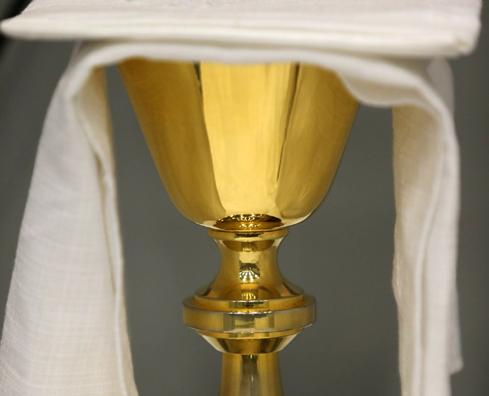
A large part of our work is in giving students access to language that can at first seem quite foreign to them. As we ground words like faithful in their world, we are equipping them for a world where God is a very real possibility for them to encounter. Being faithful isn’t something that is over there with other people but is actually a real part of our school community. As a student, I can wrestle with faith and work out who I will be faithful towards. By equipping our students with not just the words of faith but the vision for possibility, we are setting them free to explore a world beyond their wildest dreams.
Our graduates will ask those questions that are vital to life in all its fullness. How can I be faithful? What does it look like to love God? What does it mean to love my neighbour as myself? How can I connect well with others both near and far? How can I serve in a way that both helps others, but also challenges my prejudices? And how do I care for the world as a teenager and as I grow into adulthood? These are not exhaustive, but they are a good starting point.
Let me encourage you to keep up the great work across our Anglican schools in foundational faith formation. Your words and actions will shape the lives of the students we are gifted with and give them the words and actions to be faithful. If it worked for Jesus in modelling faith to his disciples some 2000 years ago then surely it will for us too. Faith, it is a gift that God has blessed us with and as we exercise it may we inspire our communities to be faithful too.
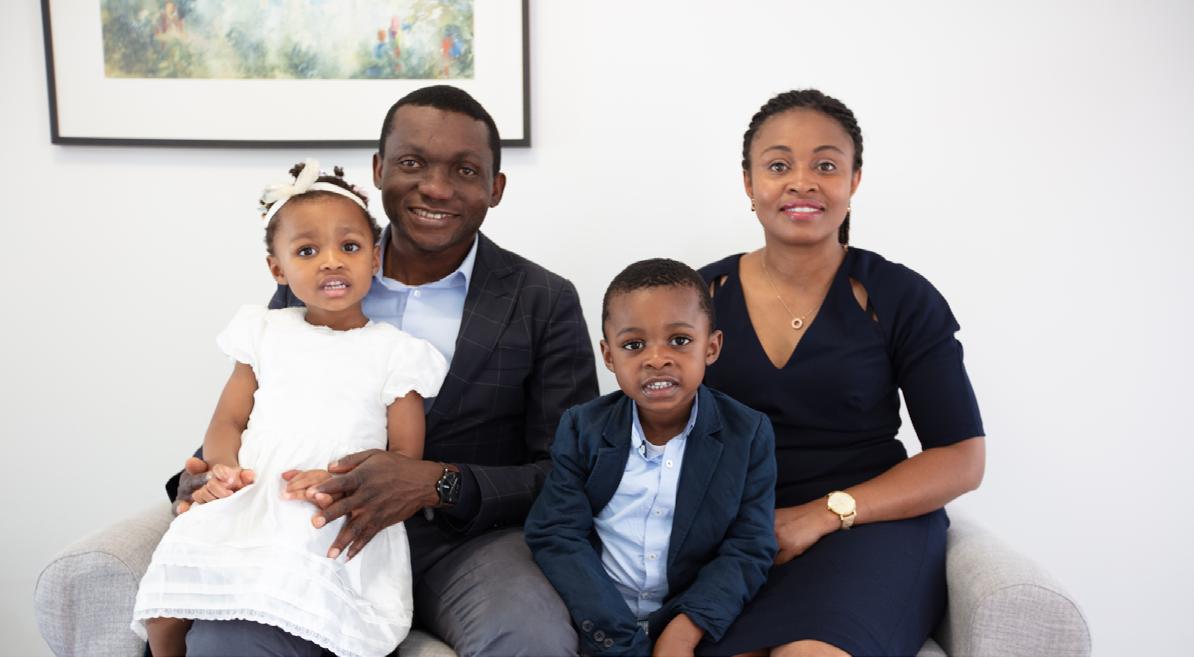
Community the key for new Chaplain
Lindisfarne Anglican Grammar School , NSW As the Nigerian proverb states, ‘It takes a village to raise a child’. And our new Nigerian-born School Chaplain, The Reverend Constantine Osuchukwu, believes this with his whole heart.
Growing up in Africa has taught Reverend Constantine about the importance of community and the contribution we can all make in helping others — particularly young people — to grow and flourish.
“I see myself as being a praying, listening, compassionate and loving Christian presence in the School as we help our young people competently navigate through life [and] achieve their potential,” he says.
“It is my desire to share with all of you the hope and joy of the Gospel of Jesus Christ, which does not take anything away from us, but rather gives us everything that makes life wonderful, true, beautiful, meaningful and joyful.”
Born in Owerre-Umudioka, Reverend Constantine migrated to Australia in 2003 at the age of 24. His recent ministry has included positions as Chaplain to Ballarat University, Parish Priest at St Paul’s Anglican Church and St Matthew’s in the Anglican Diocese of Ballarat, and Prison Chaplain at Langi Kal Kal Prison in Victoria.
He is also Co-founder of the One Humanity Shower Bus Inc. which provides support to displaced persons in Ballarat and, in 2013, travelled to Kenya to work on a project empowering disadvantaged orphans, the disabled and young single mothers in the community. “I’m humbled and excited to be joining the wonderful Lindisfarne Anglican Grammar School as the Chaplain,” he says, “and my family and I cannot wait to meet you and to immerse ourselves in the life of the school community.”
Principal Stuart Marquardt says he is delighted to welcome the School’s new Chaplain.
“The appointment of a School Chaplain is a process of discernment and, over the past four months, we have felt very drawn to Reverend Constantine and the gifts he will share with our school community,” Principal Marquardt says.
“Likewise, Reverend Constantine and his family have felt a calling to ministry within our school and community.”
Reverend Constantine took up his position at Lindisfarne in May. He is joined by his wife, Faith, and two children, Obed and Sophie.
We are excited about our new ministry lead and look forward to celebrating Reverend Constantine’s commissioning service in Term 2.
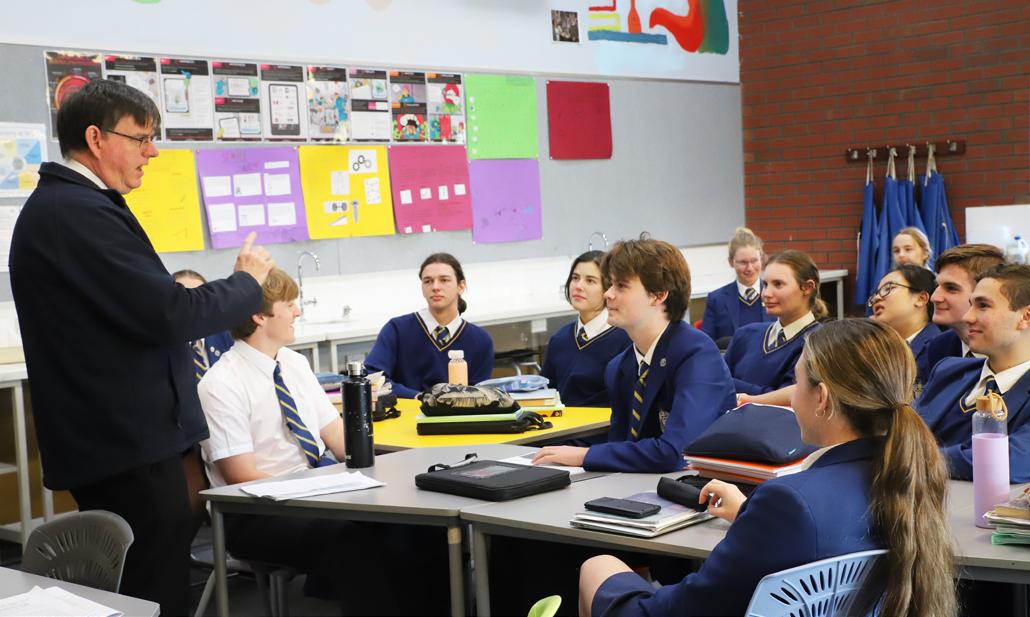
Science engaged Theology
The Reverend Canon Geoff Chadwick, Chaplain and Head of RAPS | Bunbury Cathedral Grammar School, WA Late in 2020, our School began a new course in Year 11 Religious and Philosophical Studies (RAPS) called Science Engaged Theology. Development of the course was made possible by a £2,000 course development grant from the School of Divinity at St Andrews’ University in Scotland. The grant is awarded to institutions for the purposes of teaching about the relationship between Science, Religion and Theology.
The approach is part of their new discipline known as New Visions in Theological Anthropology (NViTA). This approach asks students (and researchers) to apply the Scientific Method to matters of Theology and to apply the methods of Theology to Science.
The grant is funded by the John Templeman Foundation which “serves as a philanthropic catalyst for discoveries relating to the deepest and most perplexing questions facing humankind” and has given more than $1.5 billion towards this aim since its inception.
The grant requires that sample teaching materials, sample work, and a survey of the teachers who taught the course, be submitted to the University. How exciting it will be to have the work of Bunbury Cathedral Grammar School presented at St Andrew’s University in Scotland, and at The American Academy of Religion!
Here at our School, the students, in small groups were asked to design a thought experiment on a religious question using the Scientific Method. They made up their own hypotheses, created data and looked for conclusions. Topics included: “Does the Soul have mass?” and “Which world views or religious views are the most lethal?”. On the flip side, students then analysed topics such as “How does science use story telling in the field of Astronomy?”
The students’ knowledge of Science, Religion and Theology was measured and compared before and after the course. Pleasingly there was an overall increase of 23.8%, thus showing great success.
Students also improved their understanding of the Scientific Method and the “Tools” of Theology. Also pleasing was the students’ engagement in the process. What had once become (for some) a tiresome topic, is now an engaging exercise in creativity.
Eighteen of the students who completed the course last year have asked for a follow-up “Philosophy Specialist” course to be part of Year 12 RAPS this year. The School has obliged, and I have been preparing lessons on three of the fundamental ideas of philosophy: “The Good”, ‘’The True” and “The Beautiful.” The fact that the students themselves have asked for this initiative is indeed “Good”, “True” and “Beautiful”. It is wonderful to see BCGS creating unique and meaningful opportunities for students wanting to engage in matters of Philosophy and Theology.

ADVERTORIAL
Investing for better
Super is designed to ensure that you’ll have a comfortable retirement, so NGS Super’s purpose as a fund is to provide our members the best possible returns. That doesn’t change. But we also believe that it’s possible to invest for strong financial returns, and for the good of the wider world at the same time. In fact, as the risks of climate change become clearer, it’s vital for us to integrate environmental, social and governance (ESG) and responsible investment principles across our portfolio, to provide better riskadjusted returns to our members. And now we’re also measuring our investments against the United Nations Sustainable Development Goals, which were developed to promote a better, more sustainable future for all people. NGS Super is committed to contributing to these goals, via our investments and our Fund operations, such as how we travel and where we source our office products.
Where we can, we also undertake impact investing, such as the investments we hold with Social Ventures Australia. These make a positive contribution to society, helping to address issues such as youth unemployment and homelessness.
Find out more about our commitment to a sustainable future for all at ngssuper.com.au/sustainability.
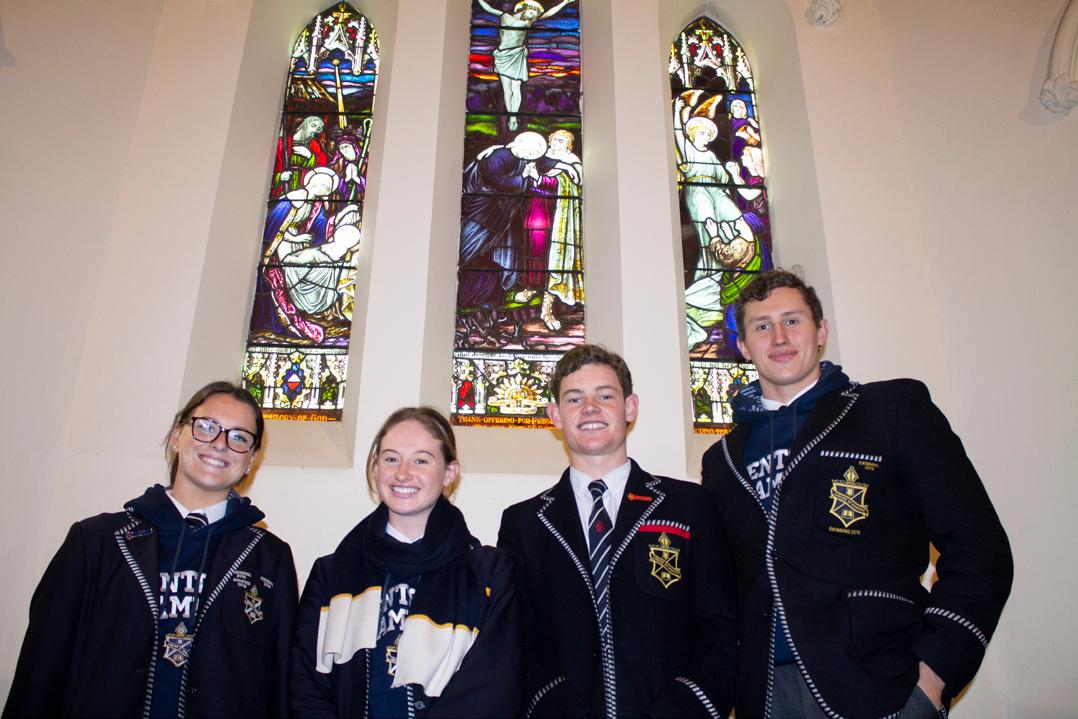
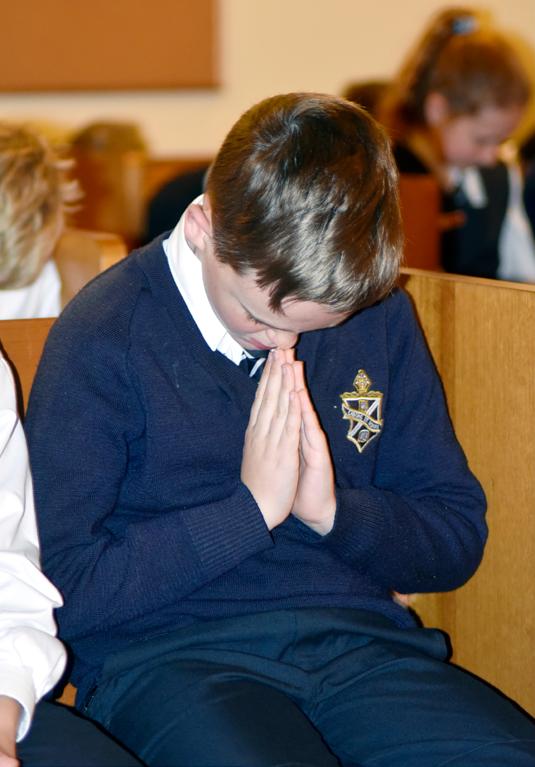
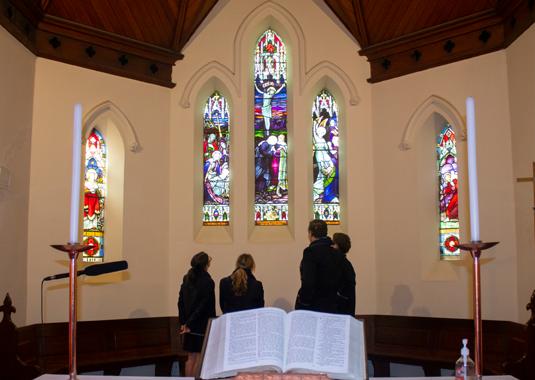
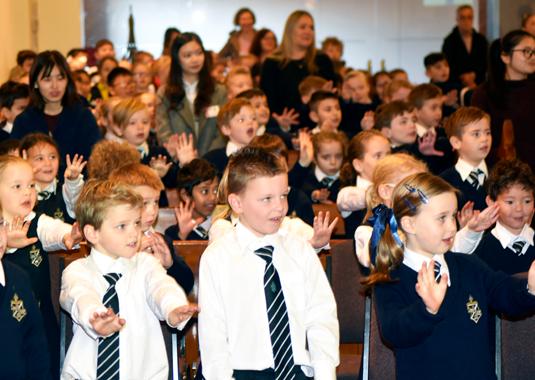
An Immersion Experience in a Living Story
By The Reverend Michael Prabaharan, Chaplain | Mentone Grammar, VIC The Anglican story is part of a more ancient story that is still transforming lives today. A story that is of immense relevance: To whom? For how long? To what end? The answers may surprise the casual observer. The Anglican school can function as the immersion learning journey that brings the story to our communities and provide the tools needed to unpack and maybe even become part of the story.
Mentone Grammar’s inception is intertwined with the parish of St Augustine’s, from which a group of parishioners founded a little local school that almost a hundred years later has become the burgeoning Mentone Grammar of today.
It is a blessing for our school to have the opportunity to regularly meet in a church building that is almost as old as the suburb which started as a beachside getaway for Melbournians, before becoming the uniquely educational suburb that it is today.
Every time we enter the building – it is a trip down memory lane, an invitation to reflect and for those comfortable to do so an opportunity to interact with God.
One of the treasures of this church building are its beautiful stained glass windows that tell the intertwined stories of a faith community that stretches back from thousands of years ago, a local community of many decades, a school about to celebrate its centenary and the faith that ties it all together. We are discovering in the discussions of today, that despite the sweeping tide of history, empire and globalisation, our ancestral stories are critical to appreciating who we are, where we have come from and how we want to develop the future.
Students at Mentone Grammar start their association with the church through the fortnightly Junior school chapels which are a celebratory gathering of songs, stories and student written prayers. While this is the first version of many types of services and classes that they will participate in, in that space, in Year 9 we ask them to delve deeper; explore the stories in the windows – make the connections, probe the questions that arise. What does it mean to be an Anglican School? How does this relate to the Protestant Reformation, the Great Schism and the Apostolic Faith? Why do we say these particular creeds and prayers? How does this faith sit among all the other major faiths and beliefs of the world?
Students also discover through the windows the tragic impact of World War I on this community. The commemoration of many lost sons that gave birth to most of the windows and the faith story that brought healing to the wounds. Some of our students have family members who had their funerals in the church, others whose parents were married there and some who were baptised there themselves.
It is a place of memory and cherishing and reflection and rites of passage. A reminder about what is truly important in life. As we look down the aisle, our eyes are drawn to the three windows that represent the core of the Christian faith. Jesus was born as one of us, Immanuel; died on our behalf, the Lamb of God and rose again to give us a path forward, Jesus Christ.
A school community is one of the tightest and broadest versions of community we have in modern Australia. It does however, for most families, end when their child leaves the school. The church, next door is an intergenerational community that envelopes people from all stages and walks of life from birth to death. It is wonderful to have the potential of this symbiotic relationship for those who want to nurture it and be nurtured by it. The faith that is introduced within the Anglican school next door to the church that welcomes people into the neverending story.
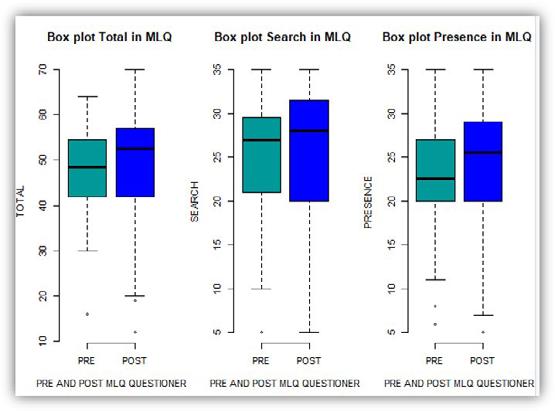
A sample of 64 students shows that after the intervention there was an increase in the total sense of meaning in purpose. Reverend David MacGillivray was one of ten staff who participated in the Professional Certificate in Future Oriented Learning (PCFOL),
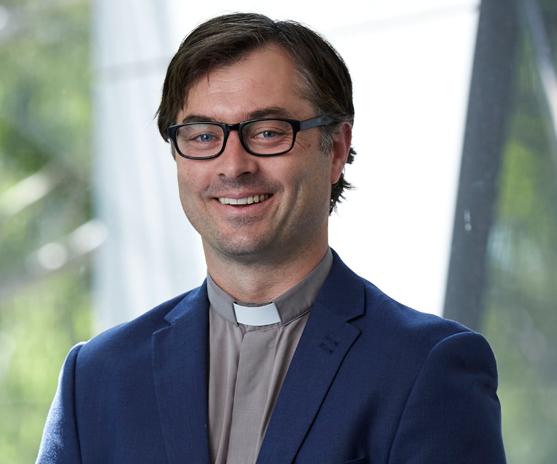
Developing A Higher Sense of Meaning and Purpose
Trinity College, SA In 2020 a research and professional learning program, the Professional Certificate in Future Oriented Learning (PCFOL), was offered to Trinity College staff for the first time through the Trinity Institute. The PCFOL is also a key component of the work of the Education Futures unit at UniSA that seeks to understand how to best implement and sustain innovation in schools.
Ten teachers participated in the inaugural PCFOL and these teachers then became leaders in the wider College network who were also connected to and supported by, university academics and practitioner inquirers at other schools. Participants shared their research findings with the College community at a PCFOL Research Showcase in December of 2020.
Trinity College Co-ordinating Chaplain Reverend David MacGillivray completed the PCFOL with a research topic of ‘Developing a higher sense of meaning and purpose among Year 12 students’.
“Recent surveys at Trinity College schools showed there has and continues to be a decline in resilience, students failing to meet their academic potential and, a significant rise of counselling for anxiety, depression and other mental health issues. I believe it is very important that we find ways to develop among students a higher sense of meaning and purpose in their lives as a protective factor,” Reverend MacGillivray said. “Meaning - as defined by renowned American psychologist, educator and author Professor Martin Seligman – ‘consists in belonging to and serving something that you believe is bigger than the self’ and is an important aspect of wellbeing. It helps to build resilience, enables people to achieve more in school and even to live longer, satisfied lives.” The Meaning of Life Questionnaire (MLQ), a ten-item measure of the presence of meaning in life and, the search for meaning in life, often used as an aid by counselling clinicians, was used as a quantitative instrument. The MLQ has been used to help people understand and track their perceptions about their lives and has been included in numerous studies around the world. a qualitative instrument in a survey to take a baseline of participating students sense of meaning and purpose in their lives. After a short course designed to develop a higher sense of meaning and purpose, the survey was taken again to measure any change in the students sense of meaning in their lives.
“Using author Emily Esfahani Smith’s Four Pillars of a Meaningful Life (belonging, purpose, transcendence and storytelling), I then crafted a series of lessons for Year 12 students aimed at developing these aspects of their lives,” Reverend MacGillivray said. “In small groups of their choosing (belonging), students designed a goal using the SMARTAR principle (purpose) to perform an act of kindness for the benefit of others (transcendence) and reflect on the process and how they felt (storytelling). A sample of 64 students across six classes showed that after the intervention there was an increase in the total sense of meaning in purpose, which was a really pleasing outcome.” Further research to confirm if there is a relationship between the sense of achievement, success in working as a team, satisfaction in the task and the improved sense of meaning and purpose in the students’ lives will also need to be undertaken.
The Trinity Institute, is leading a transformation in schooling to equip students with the skillsets and mindsets needed to flourish in a future employment landscape that is likely to be shaped by increased disruption and fast paced change.
In collaboration with key partners and educators from all areas of Trinity College, we are exploring and putting into practice structures that engage complexity and foster the emergence of student innovation and creativity or put simply, moving to environments where students want to learn rather than have to learn.
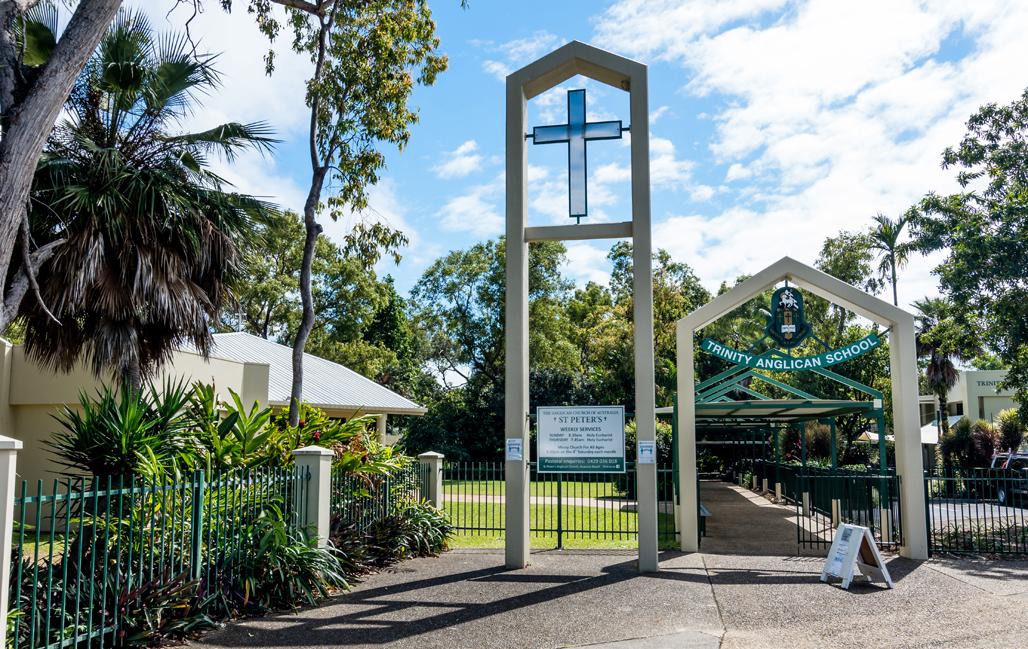
CELEBRATING 30 YEARS
Trinity Anglican School, QLD On 30 January 1991 - 30 years ago – 84 foundation students excitedly burst through the doors at Trinity Anglican School (TAS) Marlin Coast Campus, which is now known as TAS Kewarra Beach Campus (KBC).
Its foundation was a direct response to the call for more quality education in the northern beach’s suburbs of Cairns. The school decided that by establishing a campus at Kewarra Beach in addition to the existing campus at White Rock, the two highest growth areas in Cairns were able to access a TAS education.
The stage-one opening boasted, what was at the time, an innovative two-story building set amongst five hectares of native forest. Head of Campus, Revd. Peter Laurence, who is now the CEO of Anglican Schools Australia (ASA), officially welcomed foundation students with school badges and certificates, after the doors were officially opened by the Bishop of North Queensland, John Lewis.
The campus originally held five classrooms for pre-school, year’s one, five, and eight, and planned to be expanded to cover a comprehensive academic intake from Kindergarten to Year 12. Over the years, many factors influenced a decision to strategically move to offering primary education only and today the campus caters for Kindergarten to Year 6. The Kewarra Beach campus we know today is an expansive improvement on the one from 1991, including 3 two-story classroom blocks, an Early Learning Centre, extensive outdoor learning areas, recreational facilities, and more. The natural environment has become a key feature of the campus’s identity, prompting the introduction of sustainability and nature-based learning initiatives.
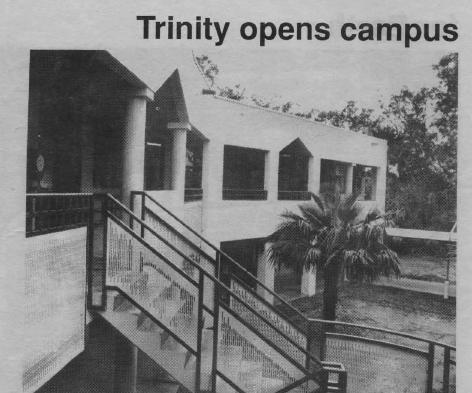
While many things have changed, our school maintains a similar vision, described by Archdeacon Ian Stuart in 1991 as follows: “TAS is where each member is valued as an individual and which offers a range of experiences to facilitate each student’s full and optimum development, and where the pursuit of excellence is encouraged”.

JESUS BLESSES THE CHILDREN: From left, Mrs Judith Tudball, Giada Dalli Cani and Fr Richard Pengelley
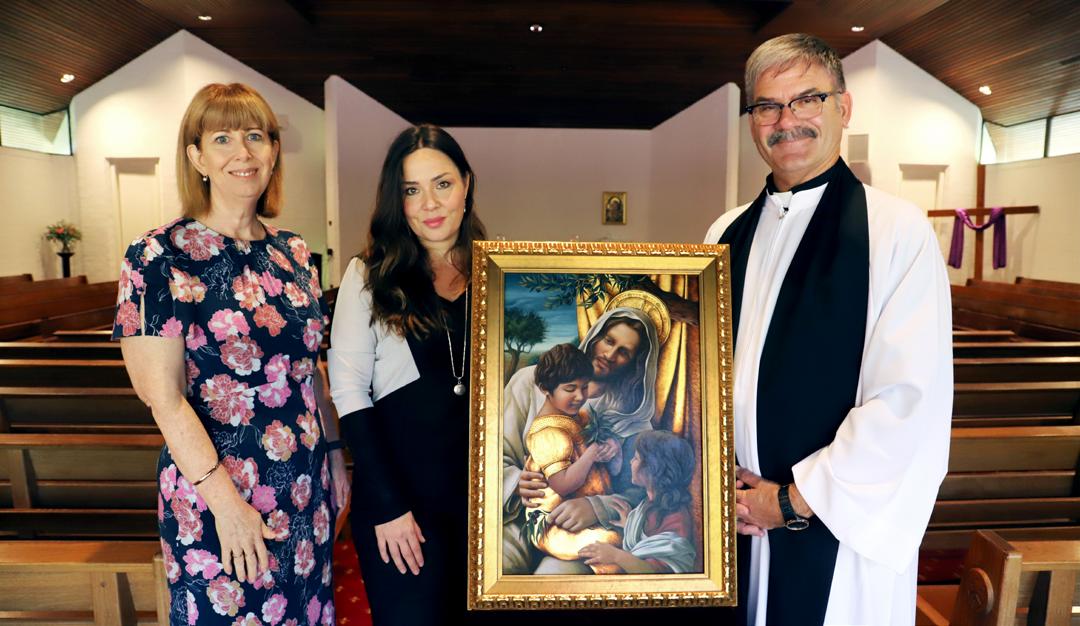
Symbols of faith
St Mary’s Anglican Girls’ School, WA Faith is a thread that runs through St Mary’s Anglican Girls’ School. The School’s motto, Fideliter, which is Latin for ‘faithfully’, is evidence of that.
As are several symbols located around St Mary’s inspiring Karrinyup campus, most notably the statue Faith, which was presented to the School in 2006 by the Old Girls’ Association in recognition of their 80th birthday in 2005 and the School’s 85th birthday.
Faith, the creation of renowned Western Australian sculptor Owen Davies, stands on a stone that formed the base of the font from St Mary’s Church, West Perth, the School’s original site. On top of the stone is a piece of marble that came from the reredos at St Mary’s Church, West Perth.
Faith depicts a 17-year-old girl who is ready to leave school and find her place in the world. She wears a Fleur de lis charm around her neck, like the one that the Old Girls’ Association presents to all Year 12 students at their Valedictory Service.
Earlier this year, St Mary’s Chapel became the home of another symbol of faith – a stunning icon – thanks to the foresight of the School’s Chaplain, the continued generosity of the Old Girls’ Association and the extraordinary talent of a staff member.
In 2010, St Mary’s Chaplain, Reverend Gerry Nixon, and Principal, Mrs Lynne Thompson, asked the School’s art and Italian teacher, Giada Dalli Cani, to paint a Madonna and Child. Giada, who trained in Visual Arts in her native Italy, produced Madonna and Child with Eucalyptus Trees, which has hung in the Chapel since. Jesus blessing the children (Mark 10:13-15). Following discussions with St Mary’s Principal, Mrs Judith Tudball, and Old Girls’ Association President, Amy Dawson, an icon was commissioned for 2021, the School’s Centenary year. Throughout 2020, Giada worked on the commission based upon Richard’s desire to present the students with a warm and human representation of Jesus. This request not only informed the icon’s scene and setting, but also the choice of Jesus’ clothes and the inclusion of an olive tree and branch as symbols of peace. One of Giada’s techniques is to apply gold leaf to her icons. This is a very precise process whereby small sheets of finely hammered 23 ct gold are gilded onto a special glue called ‘size’. The sheets are so fragile that they cannot be handled and need to be lifted by a special brush while the artist holds their breath, lest they blow away. Once applied, the surface is brushed and polished, revealing a beautiful gold sheen.
Before the new icon was presented and unveiled at the Old Girls’ Centenary Eucharist on 20 February, Giada ordered new frames so that the two icons would match. Dramatically, the truck transporting the original frames from the Eastern states caught fire while being checked at the border. However, God was gracious and now both icons are beautifully displayed in the School’s Chapel.
Now, as hundreds of staff and students enjoy admiring two magnificent works of art during their weekly Chapel services, St Mary’s extends its gratitude to the Old Girls’ Association for its generosity and Giada for her skill and dedication.
Our team of highly qualified consultants have over 100 combined years of experience in the travel industry. As trusted educational travel specialists, we can make your next educational group trip, the trip of a lifetime!

Discover Australia & New Zealand with Orbit Educational Travel
All our itineraries are designed in consultation with teachers, to help develop unique tours to meet the groups specific needs.
Check our website https://asa.orbitworldtravel.com. au/, a dedicated site developed for Anglican Schools in Australia. Unique educational tours, from Canberra Civics and Citizenship tours, Art and History of Melbourne and Sydney. Science and geography of Far North Queensland and Indigenous history tour of Northern Territory, the offer and possibilities are endless.
We have developed many cross-curriculum itineraries, to combine Canberra, Sydney or Melbourne with a snow day to the mountains, ski tours with history and sustainability experiences, to offer teachers and students the required learning outcome.
• Flexible Terms and Conditions for risk-free booking • Bonus offer for all new school group bookings • Discounted air and land prices with our exclusive partners • Trip approval documentation assistance • Promotion material • Exceptional service • Extensive risk assessment
For more infomation, contact us at: asagroups@orbitworldtravel.com.au 1300 063 280

Visit our website:
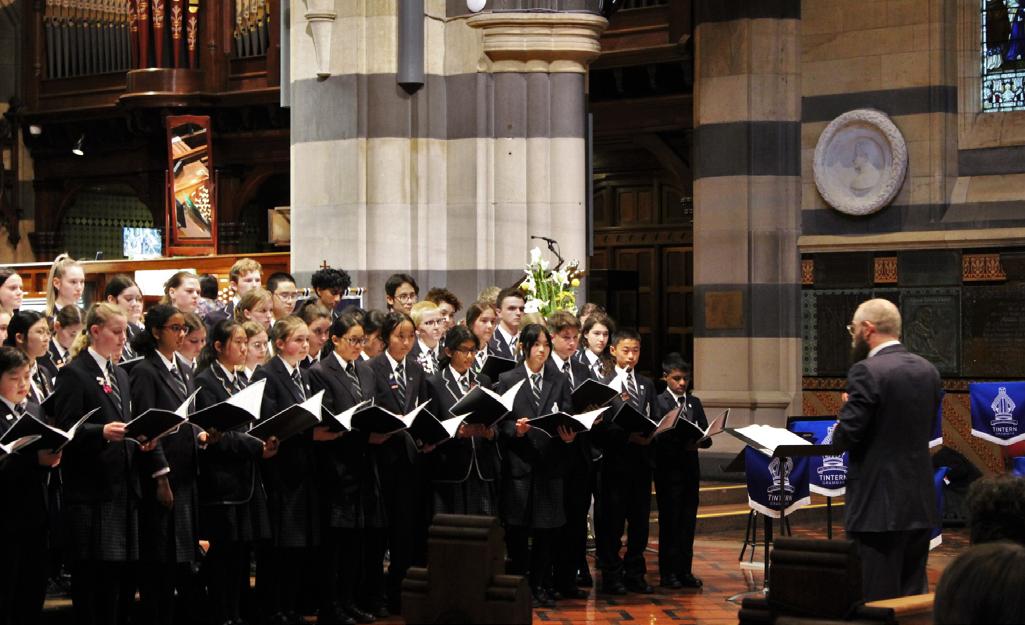
Rejoicing in Faith
By Bradley Fry, Principal | Tintern Grammar, VIC At Tintern Grammar our Anglican faith underpins our school Vision, Mission and Values, we are proud to be a connected and caring school community in the Anglican tradition.
We celebrate our Anglican faith through a range of school services throughout the year, and one particularly significant school service that was greatly missed during the pandemic was our annual Cathedral Service at St Paul’s Cathedral in Melbourne.
This year the Secondary School was able to come together once again at St Paul’s Cathedral to celebrate our annual Cathedral Service, led by our School Chaplain, The Reverend Alison Andrew. The theme of our service this year was ‘A New Creation’ in recognition that, due to last year and the global pandemic, like all communities, we have needed to see ourselves in new ways and embrace the new-found capabilities that have emerged. This is also a strong Biblical theme in that Christians are to see themselves as part of God’s good creation and we are renewed by God through forgiveness throughout our lives.
Our musicians and music staff, most ably led by our Director of Music Mrs Alison Bezaire, took us on a journey through a service brimming with music and melody. Resounding magnificently throughout the cathedral, the songs were beautifully diverse and offered opportunities for quiet contemplation in between prayer. An integral part of any church service is congregational singing, our combined Concert and Intermediate Choirs performed the songs Jubilate Deo, rejoicing in the glory of God; and the grandiose Let All the World in Every Corner Sing by the English composer, Ralph Vaughan Williams. The service was concluded by the quiet Australian Blessing by Timothy Sexton, performed by our ethereal Senior Girls’ Chamber Choir.
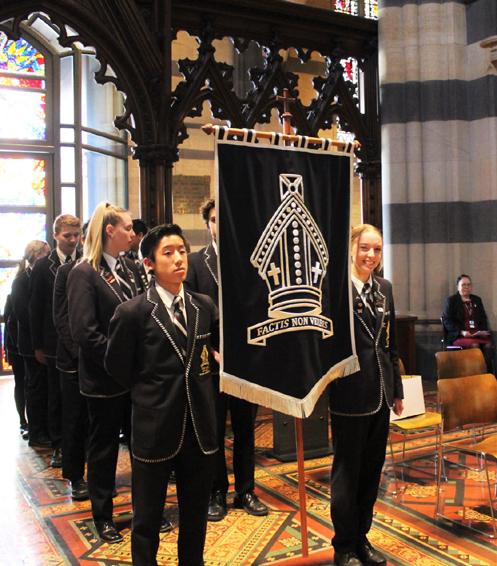
The return of our annual Cathedral Service this year facilitated the welcomed opportunity to rejoice in our faith and to once more connect with our school’s Anglican identity.
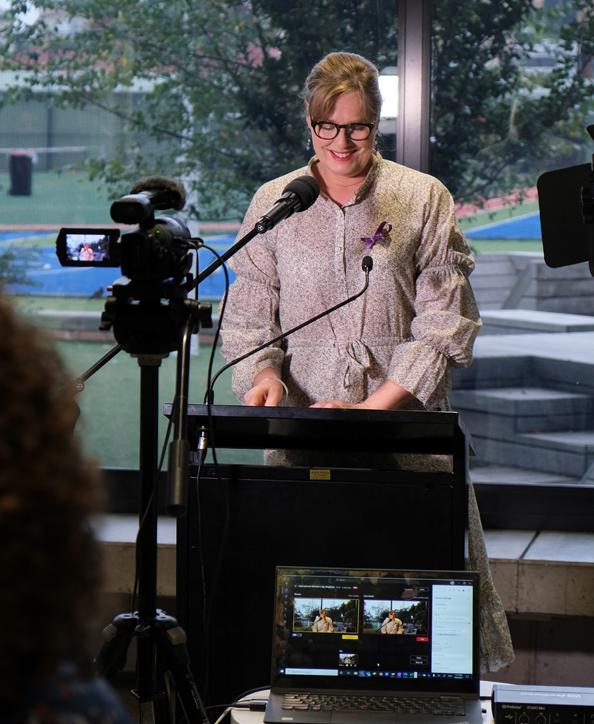
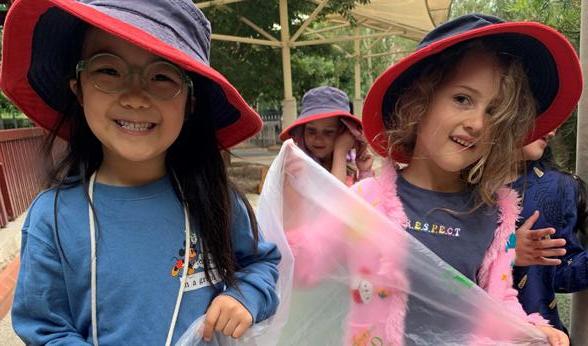
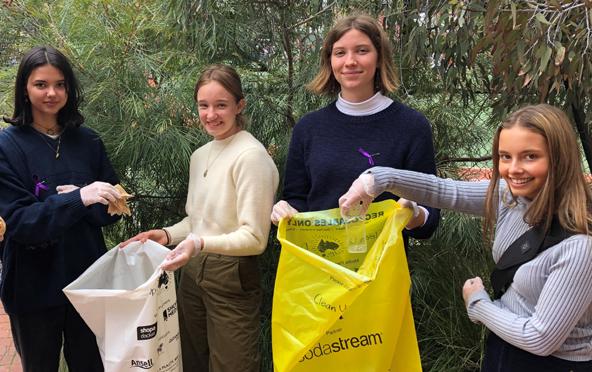
Day of Community Action
St Michael’s Grammar School, VIC St Michael’s Grammar School’s first Community Action Day of 2021 was action-packed. We celebrated International Women’s Day, Clean Up Australia Day, participated in games and raffles, and most importantly, raised money and goods for our chosen charities the Sacred Heart Mission, the Australian Marine Conservation Society, and Seed, the Indigenous branch of the Australian Youth Climate Council.
A team of students from our School Leaders, Community Action Group and Environmental Action Group worked together to ensure the day ran smoothly.
The events started early with our annual International Women’s Day breakfast in Dolly’s Café, at the heart of our school. International Women’s Day is an occasion to celebrate the achievements of women, to continue striving for gender equality and to show support for women who struggle.
The 2021 theme for International Women’s Day was #ChoosetoChallenge – a call to action to continue pushing towards gender equality. The St Michael’s community reflected on how far society has come, and how far we still have to go, to truly achieve gender equality. This year, the event was live-streamed so all parents could take part.
We were joined by guest speaker Wendy Tuohy, St Michael’s parent and award-winning columnist and editor who focuses on issues impacting women. Wendy spoke about problems faced by women today, and she praised the younger generations who challenge the status quo and the stereotypes that restrict them. “How uplifting it is to see how hugely improved empowerment appears to be among this cohort of young women, of which my daughter and her peers are a part,” she said.
Students, staff and parents contributed to the Sacred Heart Mission by donating funds, supermarket gift cards, and much-needed toiletries to women experiencing homelessness or disadvantage.
On Clean Up Australia Schools Day, we made it our mission to make Friday ‘Derek’s Day Off’! Derek is St Michael’s tireless cleaner, who the students thought deserved to put his feet up for the day. Students used bags and gloves to collect any litter throughout the day.
The high spirits of the day continued at lunchtime, when the entire campus enjoyed the music of DJ Aear (Year 8 student, Angus).
For gold coin donations, students wore casual clothes and enjoyed many activities throughout the day, raising money for the charities that had been chosen by our School Leaders.

KAURNA CULTURE: Bishop Chris McLeod National Aboriginal Bishop of the Anglican Church of Australia, Rev’d Andrew Mintern Parish Priest at St Peter’s Church Glenelg, Performers from Kuma Kaaru Indigenous Dance Ensemble and Ngarrpadla Daphney Paringangki Rickett (Daphney Rickett) – Kaurna, Ngarrindjeri and Latji Latji Elder and students from St Peter’s Woodlands.
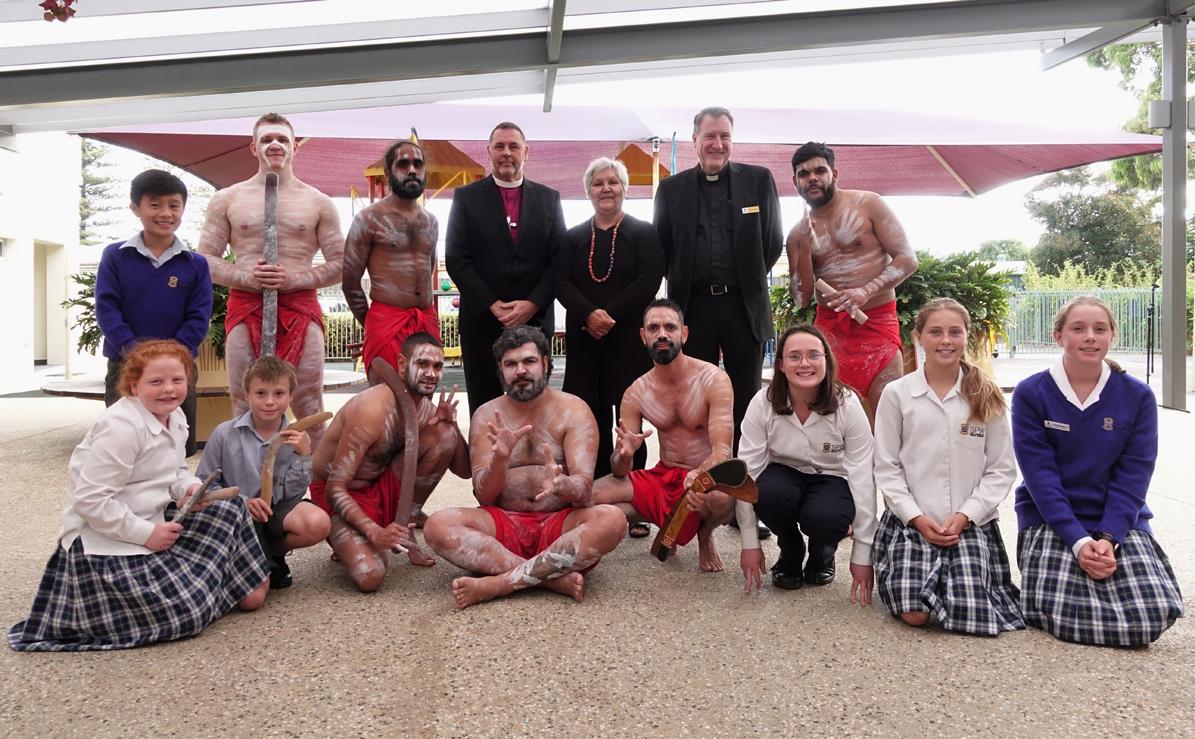
Connection and friendship the key to reconciliation
St Peter’s Woodlands Grammar School, SA The youngest students at St Peter’s Woodlands might not know how to say the word reconciliation yet, but from as young as two, these children are learning about Indigenous Kaurna culture through their connection to local elders.
Ngarrpadla Daphney Paringangki Rickett is a Kaurna, Ngarrinderi, Latji Latji Elder and a respected Indigenous artist and has been a familiar face at St Peter’s Woodlands since 2019. The staff and children refer to her as Aunty Daphney.
Over the past two years, Aunty Daphney has been running activities with students, helping to develop a Reconciliation Action Plan, as well as creating artwork for a new outdoor plaza. By forging relationships with Aboriginal elders like Aunty Daphney and providing meaningful opportunities for students to learn about Kaurna culture, St Peter’s Woodlands students are exploring how we can all contribute to achieving reconciliation in Australia.
Celebrating National Reconciliation Week 2021 To mark National Reconciliation Week, St Peter’s Woodlands held a naming ceremony for the new outdoor plaza on Thursday 27 May. Completed in 2020, the new outdoor plaza, officially named ‘Piltangka Plaza’, features artwork by Aunty Daphney. Choosing the word ‘Piltangka’, which is a local Indigenous Kaurna word meaning ‘together’ was a considered and meaningful process undertaken with respect and permission, whilst following the appropriate Indigenous protocols.
The artwork within ‘Piltangka Plaza’ symbolises St Peter’s Woodlands’ story: a journey involving the water, adults, children and a meeting place. “Each of the symbols I’ve chosen has a connection to the school, and the history of the school,” said Aunty Daphney.
“One of the symbols represents journey — the journey for students in their education, but also their lifelong journey.
“There are also symbols for water,” she said. “I’m very connected to water, being from the Riverland, but the school is also connected to water, being by the sea.”
Daphney Rickett with students from St Peter’s Woodlands in new Piltangka Plaza
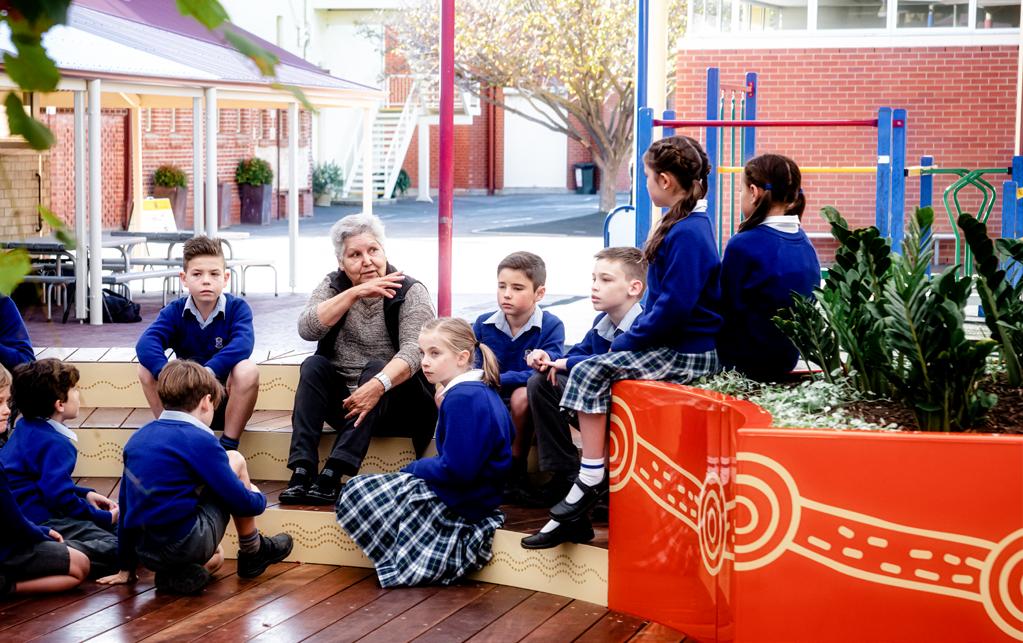
ceremony, some of the special guests included Bishop Chris McLeod - National Aboriginal Bishop for the Anglican Church of Australia, Rev’d Andrew Mintern – Parish Priest at St Peter’s Glenelg Parish, Amanda Wilson - Mayor of the City of Holdfast Bay, Carolyn Grantskaln - Chief Executive of The AISSA, as well as School Councillors and Foundation committee members.
The ceremony featured a dance performance from Kuma Kaaru Indigenous Dance Ensemble, as well as a bush tucker afternoon tea. St Peter’s Woodlands Reconciliation Action Plan At St Peter’s Woodlands, students make a connection to Kaurna culture a part of everyday school life — not just during National Reconciliation Week — thanks to the school’s Reconciliation Action Plan (RAP).
“We launched our RAP at the start of 2020, with vital support and guidance from Aunty Daphney,” said Meredith Williams, St Peter’s Woodlands’ Community Development Manager.
“Our RAP outlines the school’s commitment to strengthening relationships, respect and opportunities in the classroom, around the school and with the community. It also aims to develop an educational environment that fosters higher levels of knowledge and pride in Aboriginal and Torres Strait Islander histories, cultures and contributions.”
Making a connection to Kaurna culture part of everyday school life At St Peter’s Woodlands, both students and staff have the opportunity to be engaged in events and activities that develop their knowledge and understanding of Aboriginal and Torres Strait Islander histories and culture. These include incorporating a Welcome to Country into formal events and important occasions, flying the Aboriginal and Torres Strait Islander flags alongside the Australian flag, adding Kaurna greeting phrases to the student diaries, and replacing the learning of German in Reception and Year 1 with Indigenous languages.
As part of National Reconciliation Week last year, Aunty Daphney helped establish an Indigenous native garden in the Nature Play area with the Year 2 students. The children learnt the benefits and significance of bush tucker for the Indigenous people and the importance of caring for these plants, and also had the chance to visit the Botanic Gardens to learn about Aboriginal plant use.
Each year, Aboriginal storyteller, Trent Hill, comes in and works with the children in the Early Learning Centre, discussing the importance of storytelling as a tool to communicate the rules and ways of life through words and illustration. In addition, to celebrate National Aboriginal and Torres Strait Islander Children’s Day on 4 August, some of our Early Learning Centre children also led the school in singing Heads, Shoulders, Knees and Toes in Kaurna language at assembly.
“It has been wonderful to watch our children engage with the various activities and we hope to expand and broaden our knowledge and understanding of our First Nation People,” said Meredith.
For Aunty Daphney, working with St Peter’s Woodlands on the school’s ongoing reconciliation efforts has also been a rewarding experience.
“The work I do is a passion and I adore sharing my passion and making a connection with the students,” she said.
“That’s what reconciliation is all about. It’s important for our children to know the history of Australia, and know that racism is out there, but it’s not all as bad as it seems. I do this with an open and inclusive approach, and really just teach them that I’m Australian, I’m just like them.”
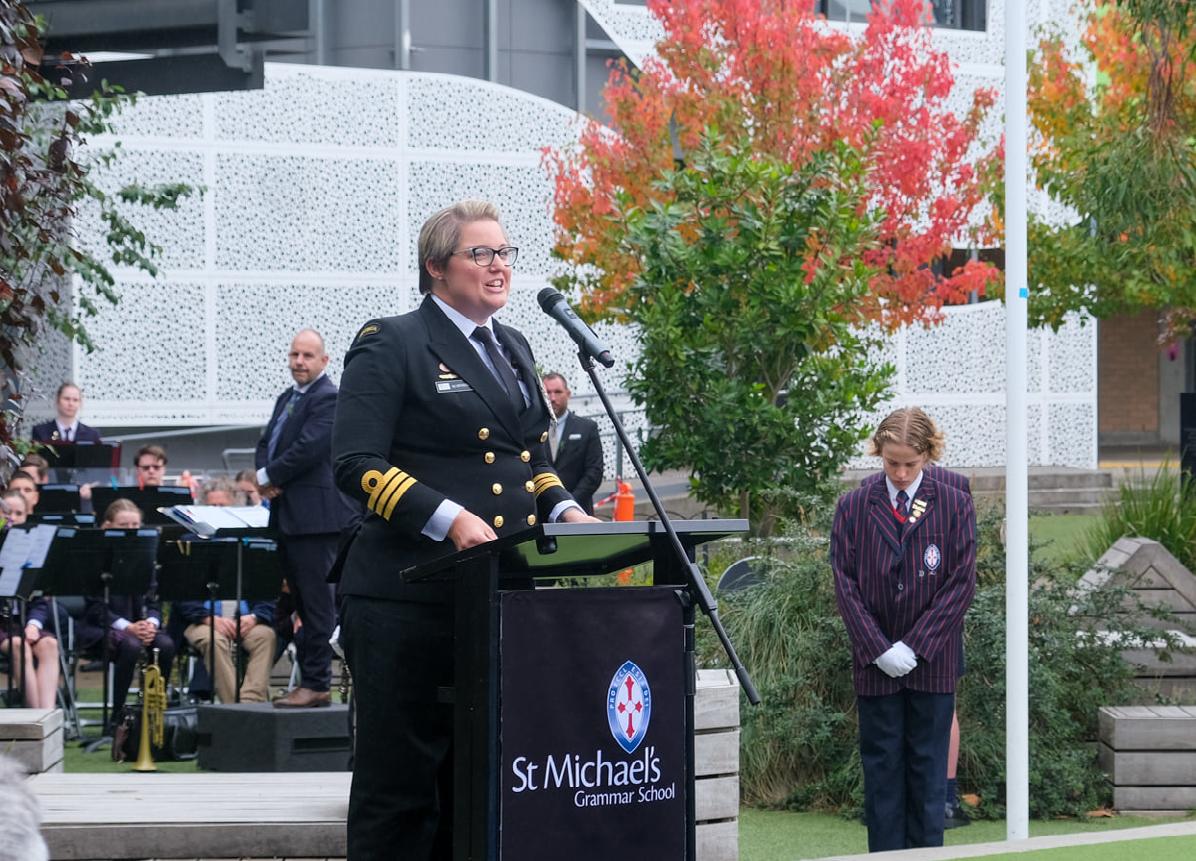
Day of Remembrance
St Michael’s Grammar School, VIC ANZAC Day is one of Australia’s most important national occasions.
As a nation, we have commemorated ANZAC Day for more than 100 years, and it has always been a time for people from all walks of life to come together. ANZAC Day is a significant date for St Michael’s Grammar School’s longstanding relationship with the 14/32 Battalion Association. Our student leaders and percussion ensemble proudly represented St Michael’s and the 14/32 Battalion in the ANZAC Day March on Sunday 25 April.
This year the School held a poignant ANZAC Day memorial service. Students wore sprigs of rosemary, a traditional symbol of remembrance, and others wore family members’ medals of service.
We were joined by guest speaker Commander Alisha Withers RAN, who grew up in Melbourne and joined the Royal Australian Navy in 2002. She attended the Australian Defence Force Academy and graduated with a Bachelor of Science (Mathematics and Oceanography). She also holds a Master of Military and Defence Studies and her current role is Operational Planner for the South West Pacific in Headquarters Joint Operations Command.
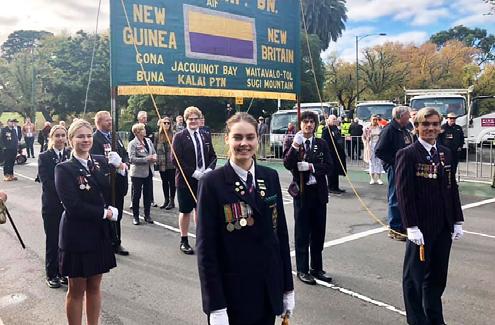
Commander Withers inspired the students and staff of St Michael’s with a reflection on her career as one of very few women in her area of expertise in the Navy. Commander Withers’ address was a call to stay true to oneself and to not allow others to reduce you, but expend your energies focusing on being the best version of you. The message about personal authenticity and presence resonated strongly with the staff and students of St Michael’s, a school proud of our inclusive and welcoming community.
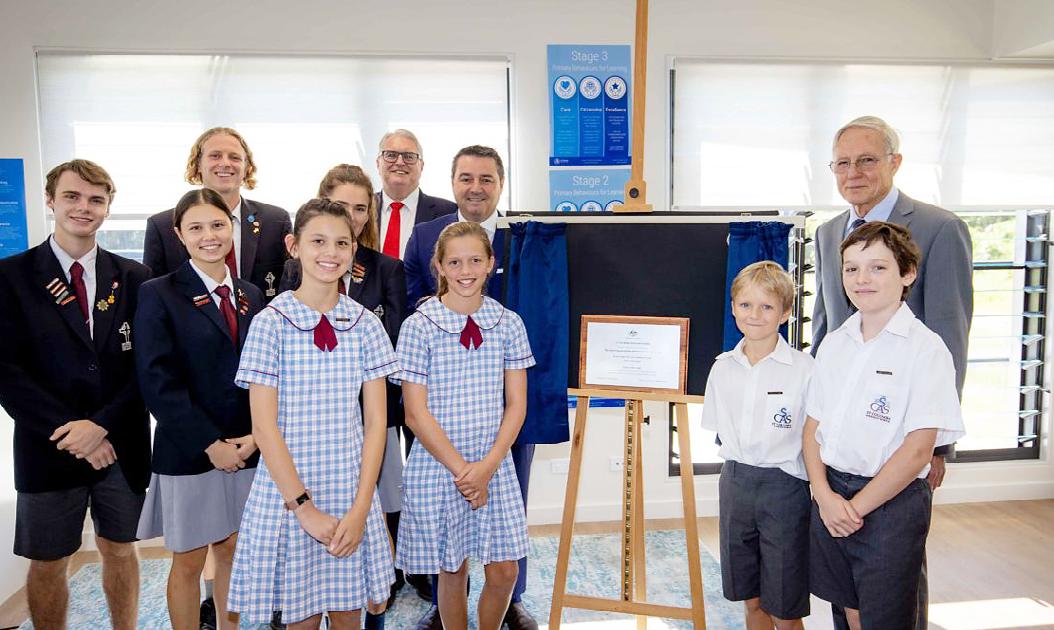
Sustainability the key
St Columba Anglican School, NSW A new Sustainability and Environmental Centre will inspire and support ideas that link education and sustainability and offer students to be a part of the solution to environmental issues according to St Columba Anglican School Principal Terry Muldoon.
“With our planet groaning under the pressure of human use of its resources, why wouldn’t we create a space where our students can learn how they can restore the health of our fragile blue planet and become the sustainability leaders our world so badly needs?” Mr Muldoon said.
The School’s new Burch Sustainability and Environmental Centre was named after former Chair of School Council Dr Gordon Burch MRurSc. PhD(UNE) FAIAST.
Dr Burch has a background in rural science and has been awarded a Fellowship of the Australian Institute of Agricultural Science and Technology. He served as Executive Director to the Australian Science and Technology Council (ASTEC) and was Chief Scientist to the Australian and New Zealand Food Authority (ANZFA). Whilst living in Canberra, Dr Burch maintained an active role in the Canberra Goulburn Anglican Diocese, serving for several years on Bishop-in-Council, and was involved in the establishment of Radford College in Canberra.
The new centre delivers opportunities for curriculum-based learning experiences as well as gardening, sustainability and community focussed activities so that students appreciate their place in local, national and international communities. Students in the Primary School have already mobilised their very own Sustainability Committee and provided a presentation at the opening celebration.
Sustainability Committee member, Grace Bunt, has already undertaken classes in the new building and is excited about its potential.
“I think this building marks a new beginning for SCAS and a new way to do things towards sustainability, it gives us more room for more ideas,” she said.
Primary School Captain and Sustainability Committee member, Rosie Ferguson said: “The thought that one day we will be part of the reason we may have a better future is exciting. Sustainability education allows us to connect especially with Indigenous land. This was their lifeline, and it is up to us to keep it from being destroyed.”
The building is home to state-of-the-art facilities that feature classroom space, outdoor spaces and access to nature trails, LED lighting to maximise energy efficiency, a fresh air circulation system, a 10,000 litre water tank for rainwater capture, real-time monitoring of environmental conditions within the classrooms and local environment, and vegetable bush tucker gardens that are currently in development.
1997: The first official college photo taken with all students in 1997, the opening year
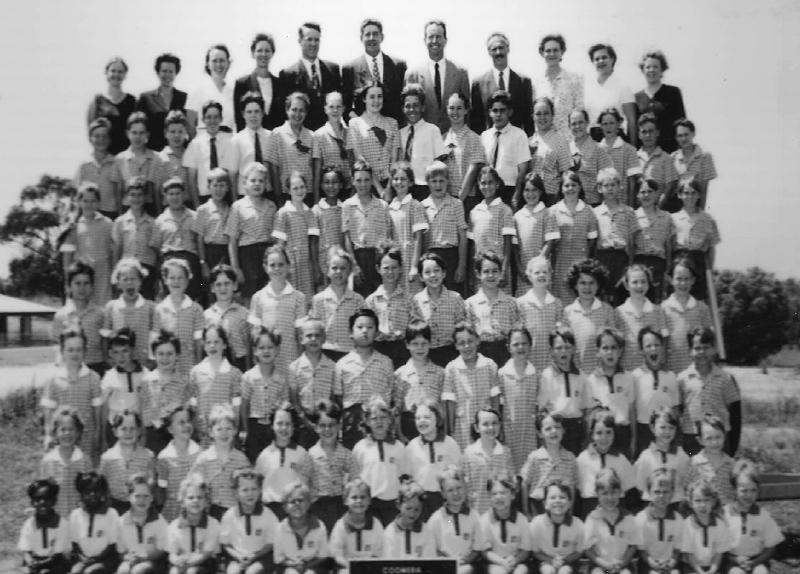
Celebrating 25 Years
Dr Mark Sly, Principal | Coomera Anglican College, QLD When Coomera Anglican College opened in January 1997, I could not have envisaged the growth and success that would follow.
That initial period in our history was very difficult; trying to establish an Anglican College in a relatively rural area, attracting enrolments when we were unknown with no reputation, convincing brave parents to send their children to a brand-new school, writing curriculum, policies and procedures, designing uniforms, appointing teachers and working with builders to complete Stage 1 buildings. We started with just 60 students, not sure how long we could survive.
In subsequent years, the College has grown and thrived, and now here we are in 2021, about to commence our 25th year with more than 1400 students. I am proud of the development of our College and the flourishing community we have become.
Our greatest strength is our people. We have a wonderful College Council, a strong senior leadership team and extraordinary staff who are all willing to do whatever it takes to bring out the best in our students. They go above and beyond expectations every day. We continually challenge ourselves to be the best we can be at all times in all things. This approach encourages students to adopt a growth mindset which enables them to believe in themselves and work hard to achieve great things.
We have always had a community focus and continue to look for ways to engage with business partners in a mutually beneficial manner. This not only provides pathways for our students, but also forges important relationships between us and our community.
In 2021, we have some special events planned to celebrate our 25th year of operation. I look forward to welcoming all members of our community to celebrate this significant milestone in the life of Coomera Anglican College.
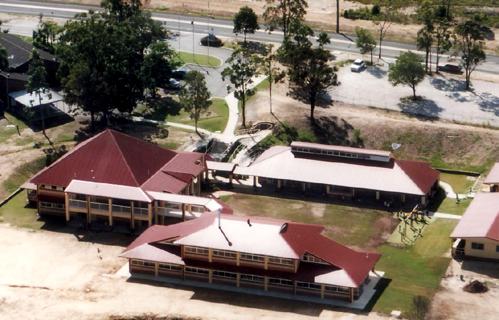
First day at Trinity College Blakeview (circa 1991)
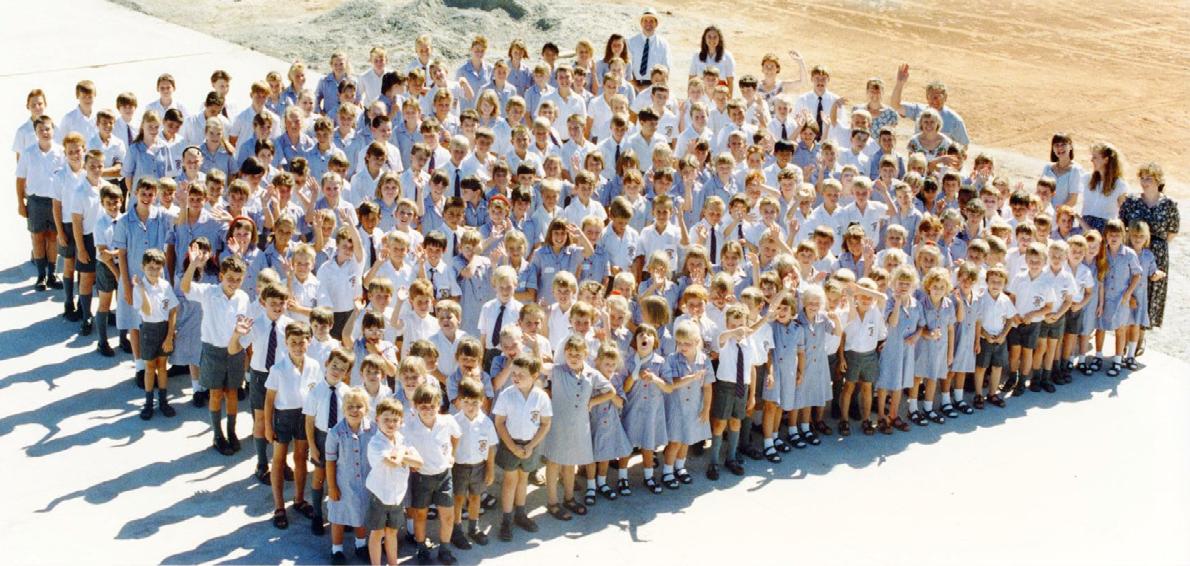
Trinity College Celebrates Anniversaries
Trinity College, SA This year Trinity College Blakeview and Trinity College Gawler River schools are celebrating 31 years and 21 years of successful operation respectively.
Trinity College Blakeview opened its doors in 1991 with founding Principal Mr Kevin Whittington, one log cabin building, one concrete play area, 15 staff and 230 students. In the year preceding the official opening, enthusiastic parents, teachers and children had planted 200 trees and devoted facilities staff toiled tirelessly to complete buildings and ensure services were connected while parents and teachers were gathering resources and painting furniture.
While there were inconveniences during the inaugural year (students needed to walk to a nearby oval to play on grass, parents got bogged using the unsealed carpark during winter and the dust during summer wasn’t much better) but, a rose garden was also planted, a drama production was held as well as a Sport Day. Pavers were laid, a pergola was built, lawns were planted and pathways and gardens became a reality. In addition to the physical trappings of the school, the renowned Blakeview school spirit was established and remains strong to this day.
A Blakeview constant is current Principal Mrs Karen McMahon who was the school’s original Reception to Year 4 Co-ordinator and Year 2 Teacher. Appointed as Principal in 2011 she has many fond memories of the school. “The photo of the first official day of Trinity Blakeview is hung proudly in the school front office and I feel incredibly privileged and grateful to have been a witnessed and participant in so many of Blakeview’s highlights and achievements.” said Karen McMahon. Like Blakeview a strong community spirit at Gawler River was instrumental in the creation of the new school. Rick Jarman recollects “When I cast my mind back to our early beginnings I vividly recall the initial working bee with our advisory group.”
“We commenced the transformation of the site, which at the time contained the remains of a dairy, a piggery, an unofficial dumping ground and what appeared to be a scrap metal yard with 13 car bodies in addition to several species of local reptiles who didn’t welcome our intrusion!”
Undeterred the new school developed remarkably quickly thanks to the energy and confidence of the people involved with a shared vision of creating something special from the ground up. Trinity Gawler River opened with 150 students and nine staff.
On reflection, life at both Blakeview and Gawler River schools may seem a little primitive when comparing both school’s current state-of-the-art facilities and enrolments that have grown consistently at both schools annually.
However, a constant at both schools has been the less tangible but no less imperative, unshakable support of parents and wider communities in addition to their enthusiastic and professional staff who continue to ensure Trinity College Blakeview and Trinity College Gawler River remain unique and special schools with solid Christian foundations, in the Anglican tradition, that provide the personal and spiritual development of each student.
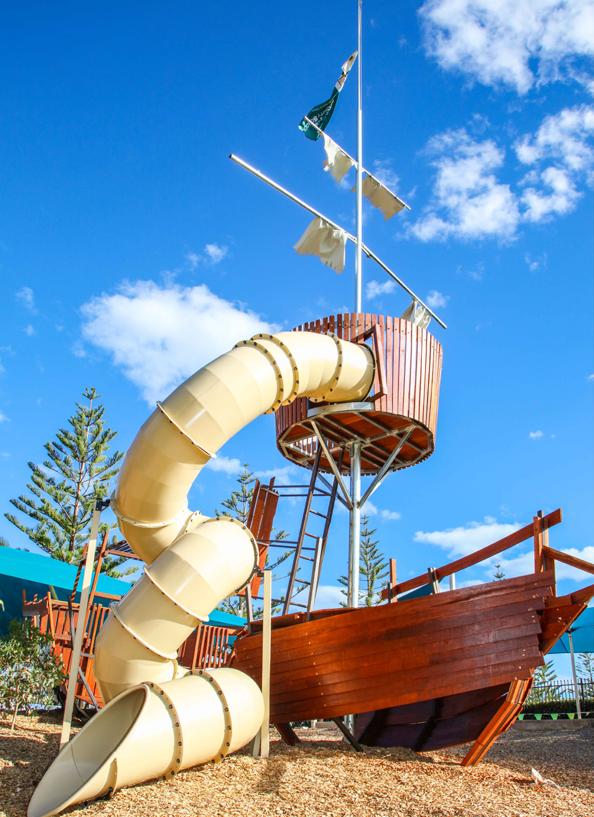
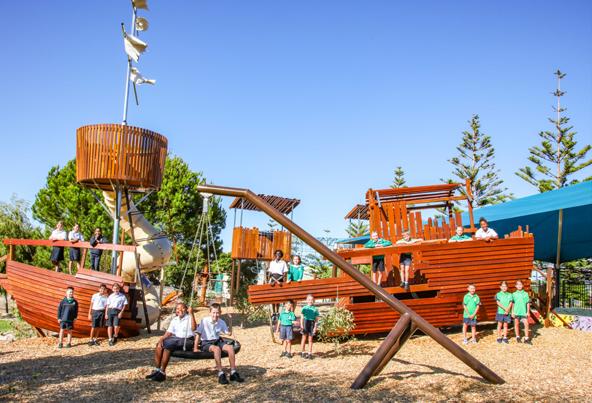
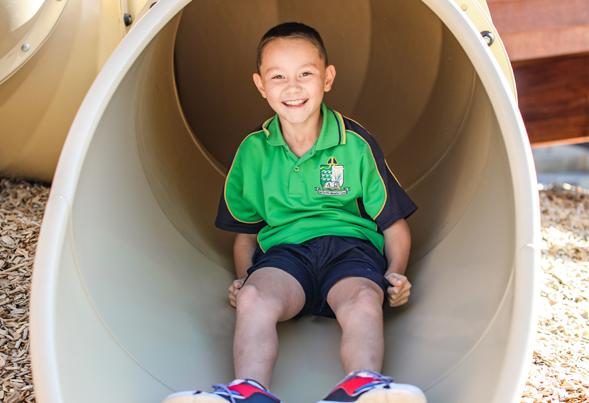
Nature Play ahoy
Peter Moyes Anglican Community School, WA A new Nature Playground at Peter Moyes Anglican Community School has been opened with the linking of Aboriginal culture, an important part of the design process.
Much anticipated by the students, the playground features a native Bush Tucker garden and a bench featuring Aboriginal art on tiles made by Primary School students.
As students and staff work to establish the Bush Tucker garden this term, the students will learn about local Aboriginal culture, the Noongar seasonal calendar and the traditional uses of native plants.
The new play area features a pirate ship, custom slide, elevated huts, nest swing, rope climbing nets, natural climbing rock wall, and many more features for the students to explore and play in.
Associate Principal, Primary School, Roderick Wood said bringing the play-based pedagogy from the Early Years through to the Year 1 – Year 6 play area had been a key focus for the School. “Students in our Pre-Kindy to Pre-Primary area have enjoyed a wonderful playground for the past five years and deserve an equally stimulating environment once they move through to Year 1 and beyond,” Mr Wood said.
“Nature playgrounds such as these provide students with physical skills, problem solving, co-operation and prompts their imagination and creativity, which ultimately supports our inquiry and play-based learning philosophy at Peter Moyes.”
With funding from the Parents & Friends’ Association, plans for the extensive Nature Playground commenced with Stage 1 in 2019, completing the project with Stage 3 in Term 2, 2021.
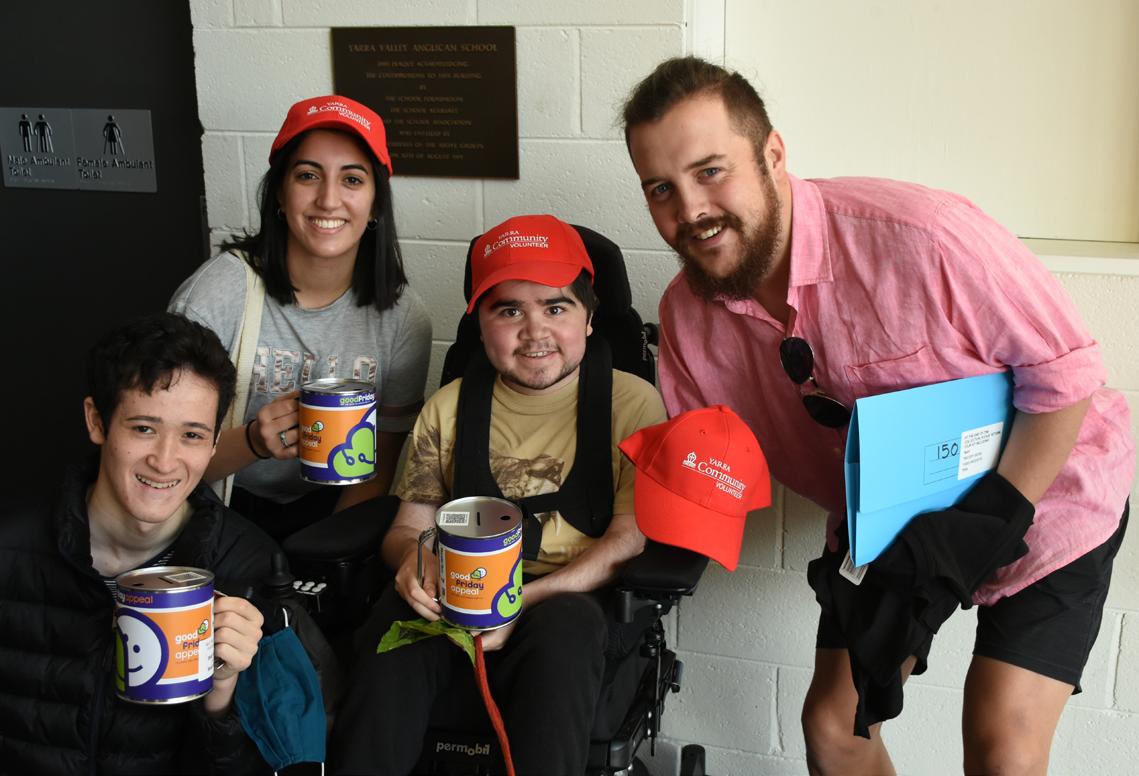
Tradition of giving
By The Reverend Paul Joy, Chaplain | Yarra Valley Grammar, VIC A strong tradition at Yarra Valley Grammar is our involvement in the Royal Children’s Hospital Good Friday Appeal. The School community has been partnering with the Pied Pipers since 1985 and collected more than half a million dollars by door knocking in the local community on Good Friday.
Following a virtual reimagining of the event in 2020, the School community were excited to be able to participate in person again this year. And, they turned out in record numbers!
More than 500 students organised themselves into teams of three to five friends. They harnessed the support of a parent driver and registered at the School at 9.00am on Good Friday morning. Inside four hours, more than 800 members of the Yarra community including students, parents, staff and Old Grammarians collected $48,693 to donate to the Royal Children’s Hospital.
“Our Chaplain spoke about faith in action at our School Easter Service just days prior,” Principal Mark Merry said.
“It seems the students and our wider School community took those words on board and showed up ready to serve and make a difference in a really practical way.” Good Friday, some of our School community have adopted the Good Friday Appeal, a version of faith in action, as part of their Easter tradition.
Part of our Anglican identity is to live out our faith in our daily interactions and commitments. Our involvement in three major Community Links events in Term 1 this year raised and contributed more than $60,000 to the Leukemia Foundation, Share the Dignity and the Royal Children’s Hospital.
Our contribution to the wider community is an important part of our School culture that is motivated by our desire to allow our lives to reflect the foundation of faith we have.
Showing kindness, rolling up our sleeves to help others and making a small sacrifice of time and effort to make a positive difference are ways we endeavor to put Jesus’ words into action.
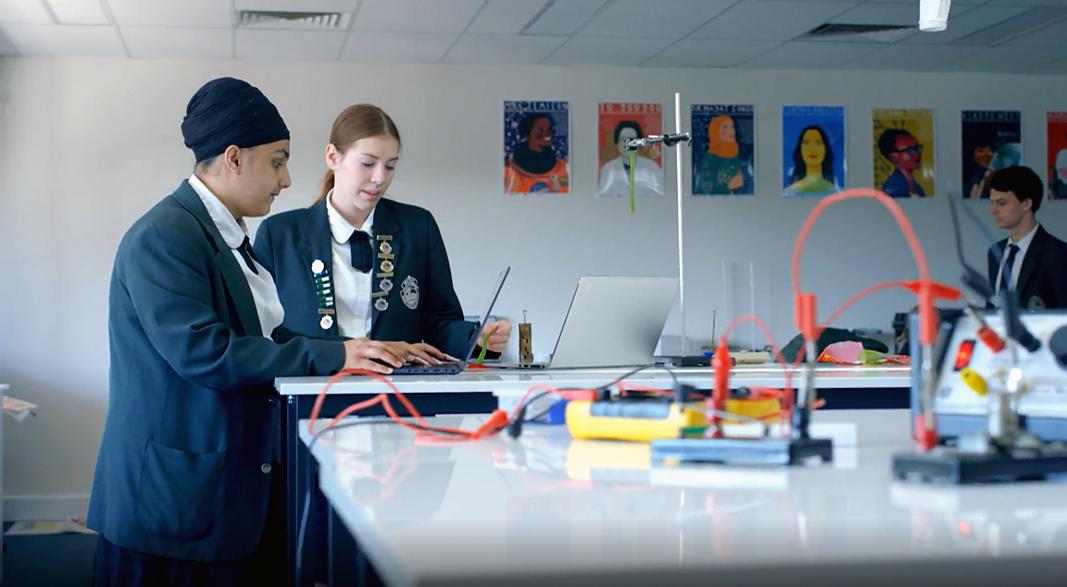
New possibilities for STEM
Bishop Tyrrell Anglican College, NSW A world of possibilities has opened to Bishop Tyrrell Anglican College students after the transformation of the College’s science laboratories and the creation of a new flexible learning space for STEM classes.
Head of Science Brett Owers said the facilities created opportunities for students.
“With access to these incredible new spaces, Bishop Tyrrell Anglican College students will be better positioned to learn hands-on skills that will serve them well for future studies and workplace opportunities,” he said.
The layout of the new STEM lab is designed to be highly collaborative, facilitating the tinkering and creating that students love to do in this subject. STEM at Bishop Tyrrell Anglican College teaches students to solve complex problems and use design thinking skills, and cultivates intellectual qualities such as curiosity, questioning, intellectual rigour, hard work and openness to ideas.
“A class might begin with an introductory theory lesson on robotics in one of the contemporary seated learning areas with a range of round table seating options to further facilitate collaboration, and then move to the high benched areas to work on their own coding or robotic project,” Deputy Principal Tania Lloyd said. Year 11 student Megan Williams is aspiring to study Mechatronics at the University of Newcastle. Upon seeing the new labs for the first time, Megan said: “It was hard to believe that it was our lab. Everything is brand new and state-of the-art. The environment for me is more conductive for learning. The new clean space makes me want to spend even more time on this subject than I already do.”
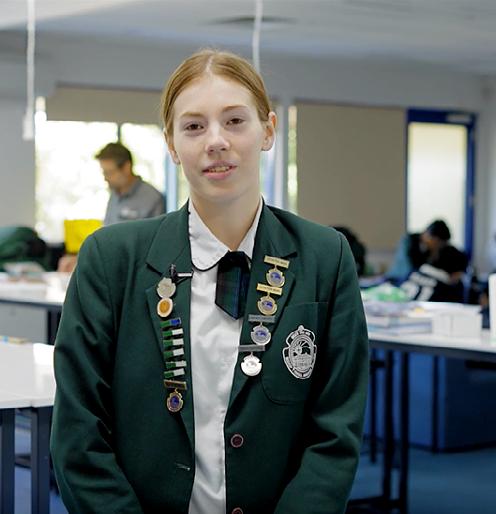
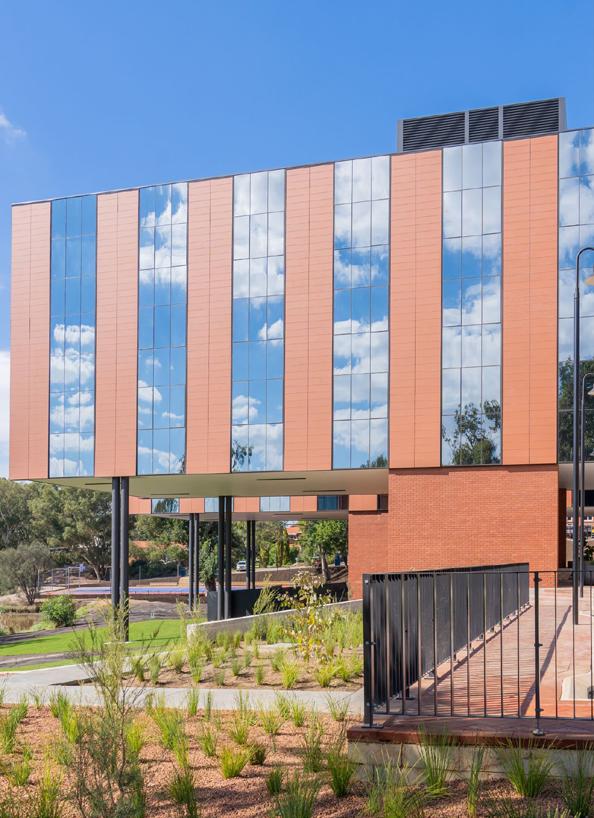
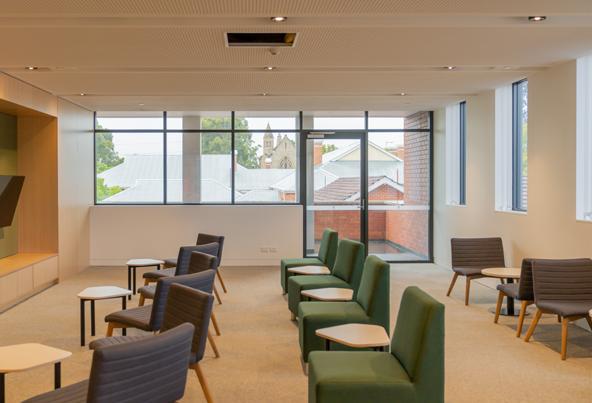
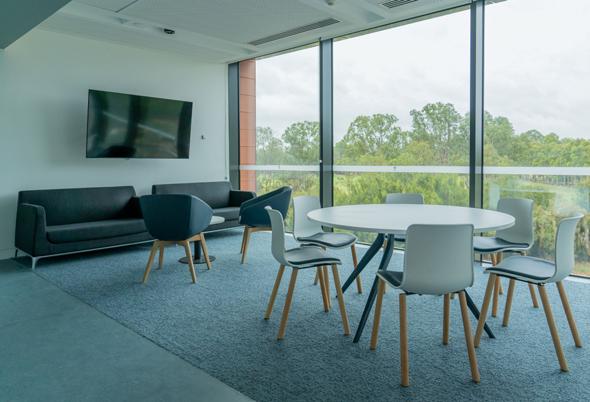
A new piece of boarding history
Guildford Grammar School, WA With a history of boarding dating back to the 1800s, it was a celebration of the new when Guildford Grammar School officially opened their new Boarding House with the whole school community.
The Boarding House opened its doors to its current boarders on Saturday, 6 March 2021 when 115 girls and boys from regional Western Australia, interstate and overseas moved in to the purpose-built facility.
Principal Anne Dunstan said boarding was a vital part of the culture at Guildford Grammar School.
“The opening of this new, exciting facility is an important milestone in our School’s history and is made even more special that it coincides with our 125th Anniversary year,” she said.
“Our boarders bring diversity, fresh perspectives and a cultural richness to the entire school community.”
The history of boarding at the school dates back to the 1800s when girls and boys resided in Woodbridge House. The new facilities can accommodate up to 132 boarders with separate and secure living areas for girls and boys, and common areas and lounges for relaxation, study and group gatherings.
The facility houses several residential staff and their families and also contains a dedicated space for boarding parents to be welcomed. The bright, comfortable and contemporary spaces are designed for modern day living and with boarders’ needs at the forefront.
“I’m excited to have all boarders in the same house. We can make even more friends and connect with more people, which will make boarding life even better,” said Summer, a current boarder.
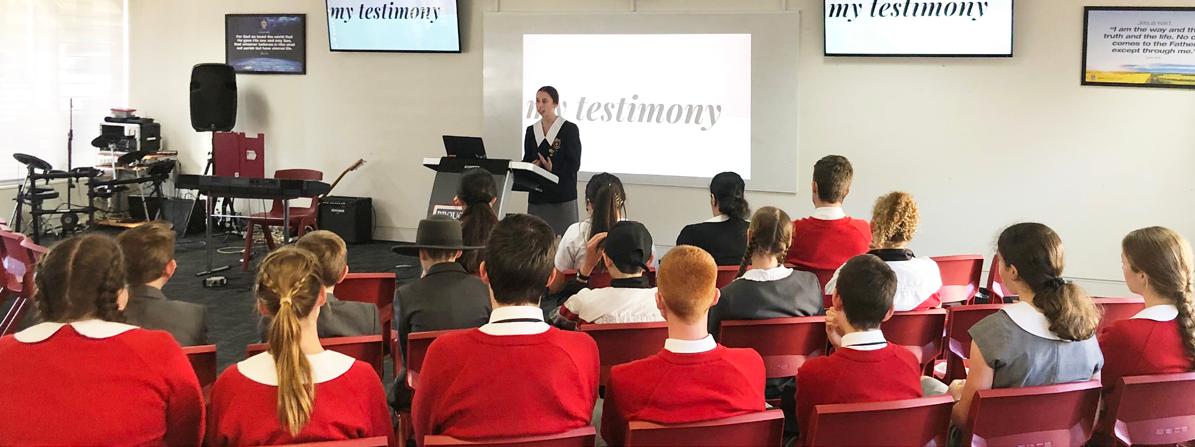
Christian Community for Faith Development
By The Reverend Mark Schroder, P-12 College Chaplain | Broughton Anglican College, NSW The gathering of God’s people has been central to what Christians do for a very long time. Our Anglican schools provide such an opportunity for students to meet in the same way.
Our Anglican schools ought to be places that foster Christian community so that students can grow in their faith in Jesus. A simple but effective way in which we can do this is to support and encourage Christian lunch time groups.
Christian groups are important at School In my own context, the aim of our Senior School Christian group, fondly known as R.A.G.E (Revolve Around God Everyday), is to promote and encourage ‘life through Christ’. This is the College motto and is encouraged in all aspects of life together at Broughton Anglican College. As a College we want to develop in students an understanding of this motto so that many might actually choose to adopt it as their own and live a life through Christ, because their faith is in him alone.
Therefore, as a Christian community our Christian Lunch time group exists to affirm believers as they commit to doing Christian things. As they study God’s word, as they pray together, as they praise God and as they encourage one another in Christian fellowship so they are discipled and prepared for a life of faith. This group also motivates and equips our Christian students to live out their faith to engage their friends in the Christian faith and invite them to live a life of faith in Jesus too.
There are many stories from Chaplains and Christian teachers and leaders about students who have been encouraged to live out their faith or join up to the faith because of our Christian groups.
Additionally, my experience tells me that a healthy Christian community sets culture and expectation for the greater school. An active Christian community can in many ways lead the school as they support and happily engage with the Christian approach to life.
The importance of Christian education is truly set when the school structures and systems support the Christian groups in a school. In many ways how the school values the Christian group will set the scene for what the school is about, what it prioritises and the message it wants to send to the school or even wider community. In these ways and more, we need to also keep in mind that our Christian schools have an important role in partnering with parents and families in raising children to know, believe and live out the Gospel. But our Christian groups are not only important at school: our world is complicated! So, having a faith-affirming Christian group in our school ought to be a space for oxygen and joy! Christian groups are important for life in a complicated world Providing a positive Christian group with affirming community sets Jesus before students and so it sets joy before students even in the face of much uncertainty that this life presents. This is not a passing joy, it’s not momentary, but it’s eternal! This joy is essential for everyday living! Secondly, the reality is that life only gets more complicated as time goes on. The school assessments and the HSC could be considered only the tip of the iceberg when we consider the stresses of a full-time working mother, or a university student commuting regularly to study a double degree in law and science and also hold down a casual job, a social life and maintain a distinction average. Life is tough and students need to be prepared for that! I actually think that by providing a good Christian community group in our schools, we help in establishing a routine and standard for the future. As students leave our schools and head to other things, keep in mind that there are other Christian community groups available in the ‘grown up world’. These include community groups at Church, Uni, at work or simply in the family at home. In many cases we are providing a springboard for students to continue in their faith, long after they have left our school gates. What we do in our Christian groups is important. Immediately important for life at school but also important for life in a complicated world. But the community that we build in our Christian groups must be built on Jesus. Jesus is what makes a community Christian, so, as I see it, if we want Christian community that affirms and equips students for a life of real faith we must do Christian things. Just like the early church in Acts 2. They were devoted to Christian things, how about us?
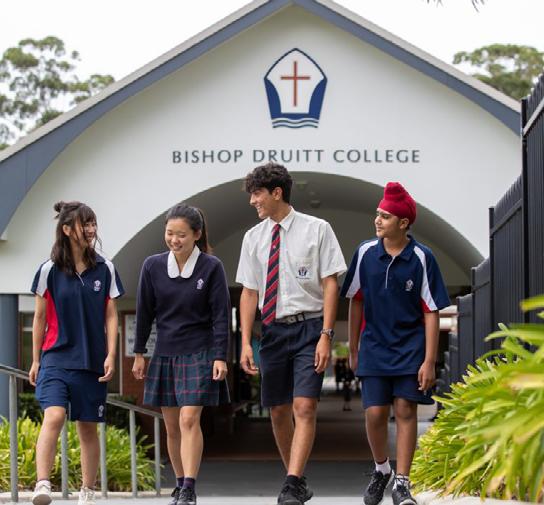
Respectful Relationships

By Nick Johnstone, Principal | Bishop Druitt College, NSW
Much has been written, in both the Sydney Morning Herald and the Melbourne Age, about the issue of peer on peer abuse amongst teens. Peer on peer abuse includes issues such as bullying (including cyber bullying), sexting, initiations or hazing, physical abuse as well as sexual harassment and sexual violence. Recent data suggests that peer on peer abuse accounts for 25 per cent of all child abuse. As this figure would suggest peer on peer child sexual abuse is a growing concern and is the focus of this article.
I wish to note that peer on peer abuse in teens is currently a cultural issue and not related to any particular ethnic background or region or schooling sector and the issue can’t be dismissed as ‘boys will be boys’ behaviour. This type of rhetoric is both dismissive and does not address the significant harm that is caused with these encounters. Other language that is of concern is ‘it takes two to tango’ or ‘she must have done something to deserve it’. No person, regardless of their gender or sexual orientation deserves to be sexually abused. This issue can’t also be dismissed as boys behaving badly due to heavy alcohol consumption or peer pressure. These assaults reek of a culture that lacks social conscience and empathy.
As a society we need to work together to address this issue. It will take a series of efforts to institute change and this shift in behaviours will not occur overnight. Parents and carers together with schools and community leaders need to take the time to have these difficult conversations with our teens. A former Prime Minister, Malcolm Turnbull, stated that: “all disrespect of women does not end up with violence against women, but let’s be clear, all violence against women begins with disrespecting women”. This statement rang true for me. It is all about building respect.
Dr Arne Rubinstein, author of The Making of Men and founder of the Rites of Passage Institute, has developed programs to create the shift in mindset and resultant behaviours from those of an egocentric boy to a healthy adult male. He states: “Boys believe they are the centre of the universe, whereas Young men need to know they are part of the universe. They also need to know that Power is actually for the good of my community and not something to be abused. They have to be responsible and accountable for their actions.” At present Dr Rubinstein believes that it is critical for boys to develop a new mindset when they reach puberty or the problems will perpetuate into adulthood. They need to be having difficult conversations and exploring these issues before they are out in the world wreaking havoc. Parents, schools and mentors are critical influencers in the development of these respectful behaviours, we simply can’t be leaving the boys to try and work it out for themselves.
Contrary to many media reports, schools are being proactive in this area. In NSW, the Personal Development and Heath and Physical Education curriculum mandates that schools teach child protection in every stage of learning from Kindergarten to year 10. This process is supported with additional targeted programs such as the Love Bites program which addresses issues such as relationship violence, sex and relationships and the concept of consent. Many schools will also have a positive education focus within their pastoral care programs.
Dr Tim Hawkes, former Principal of King’s School in Parramatta and ambassador of the Fathering Project says that: “we need to be outraged as fathers to the extent that we don’t allow these things to happen“. Dr Hawkes explains the importance of talking to your children and teens about the various ways consent can be conveyed. He noted the importance of positive role modelling, the power of language, as well as non-verbal communication such as body language. When it comes to the very important issue of consent, he states, “what was once a ‘yes’, on one occasion, can be a ‘no’ on a different one, and that’s ok.”.
Dr Hawkes, believes that parents should address the following issues with their children: • Consent should be; freely given, reversible, informed, enthusiastic and specific • Consent must be given clearly – for example, silence is not consent, being under the influence of alcohol or drugs, is not consent. • You have every right over your body and to set boundaries. • Educate them about making the right choices, surrounding themselves with friends they trust and getting them to talk about these issues as a friendship group either at school or with their parents there to support them. • Discuss drink spiking and ‘safe’ levels of drinking, for example the dangers of pre-loading.
I encourage parents to be proactive in this area and also to praise and support their schools with the continual development of programs that focus on building respectful relationships. Finally, I wish to thank Natassia Chrysanthos, the journalist in the Sydney Morning Herald, who has given this issue the gravity that it required to be addressed.
If this article has triggered a negative response please utilise the support services below: Lifeline 13 11 14; beyondblue 1300 224 636; Domestic Violence Line 1800 65 64 63; 1800-RESPECT 1800 737 732
Our team of highly qualified globetrotters have over 100 combined years of experience in the travel industry. As trusted luxury travel specialists, we have access to many club benefits for you. We are a member of the highly regarded Virtuoso network, Luxury Circle Club and Cruise Co. Reach out to an expert, to see how these benefits will make your next trip, the trip of a lifetime!
Looking for a quick domestic getaway?
Our Virtuoso partner hotels have various offers for stays across Sydney, Melbourne, Perth and far North NSW. With Luxury Lodges across the continent with Stay/Pay Offers, bonus Sunset Cruises and included bar tabs & spa treatments, among the offers available at some of the country’s top hotels.
Our favourite offers for the coming months are Stay for 3 and only Pay 2 nights at Shangri-La Sydney with breakfast & a $100USD Food & Beverage credit and upgrade.
Or how about a stay at The Ritz-Carlton in Perth. Including breakfast, a $100USD Food & Beverage credit plus free Valet Parking!
We also have a Virtuoso Exclusive offer for Halcyon House on the far north coast of NSW with 2 nights’ accommodation. Includes breakfast, lunch and dinner daily, mini-bar, afternoon drinks, a welcome cocktail and wine & nibbles in your room on arrival from $2,660 person plus fragranced candles and beach towels to take home.

The return of Cruising

Celebrity Cruises is set to return to our local waters this coming summer with a bumper season planned for 2021/22 and 2022/23 with The Celebrity Eclipse calling Sydney and Auckland home.
There is plenty of options from 2 days Samplers and short domestic trips to longer New Zealand and South Pacific trips and the 18 night journey to Tahiti, Bora Bora and Hawaii.
Celebrity Cruises has also introduced Always Included on all Australian departures with Drinks, Wi-Fi and Service Charges included in every fare. As a Virtuoso Partner by booking with Orbit World Travel you’ll get added bonuses with every booking and with flexible deposit & payment options it’s a great time to book. Ponant Cruises is offering a range of local departures for 2022/23. With no Solo Supplement, escape your snoring partner or take a friend and each have your own cabin.

There is a range of Kimberly and coastal voyages around Australia with departures from Darwin, Broome, Perth, Cairns, Hobart and Sydney. Early booking Ponant Bonuses of up to 30% with flexibility for deposits and later payment dates – it’s a great time to book your dream all-inclusive getaway.
For more infomation, contact Aaron Spriggs at aaron.spriggs@orbitworldtravel.com.au 1800 249 804
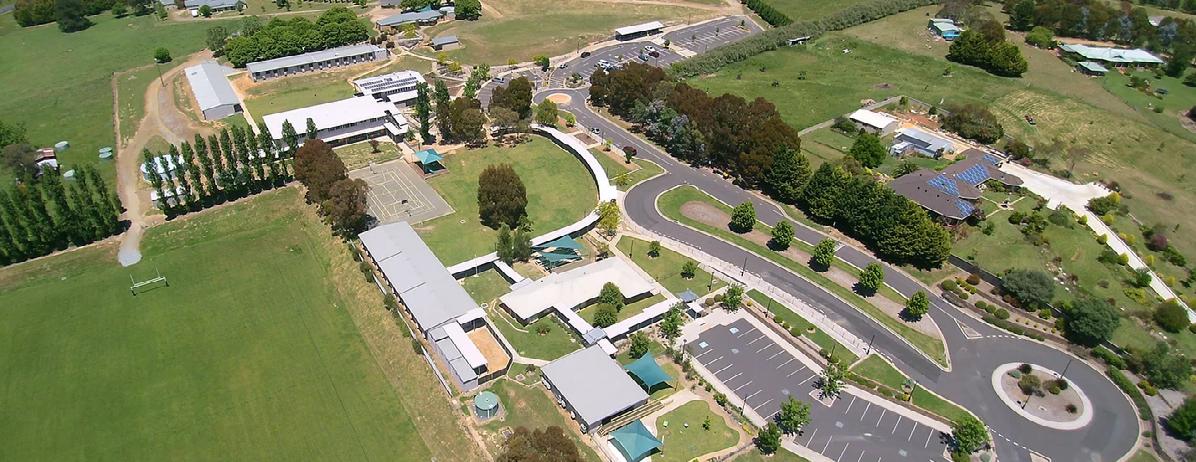
Students Grow in faith
By David Whittingham, Head of Chaplaincy | Orange Anglican Grammar School, NSW
At Orange Anglican Grammar School (OAGS) a group of nine teens in years 9-11 have begun meeting on Tuesday afternoons in a group simply titled Grow. Their aim is simple - to grow in their faith. As an Anglican School we are particularly well placed to wak alongside these students as they journey in their faith. Faith has been identified as one of the six themes in enhancing our Anglican identity. This is one part of the story of how that is being explored at OAGS.
Young Anglicans meeting The Anglican Church has a long tradition of young people meeting together to discuss the Bible, what the latest theologians have been saying and how it all relates to the world today. In the 1520’s, in the White Horse Inn at Cambridge, many future Anglican leaders met to discuss the Bible and the ideas of Martin Luther. Ever since then young Anglicans have met together in schools, universities and churches, honing and shaping the faith that ultimately led them to do remarkable things later in life.
Grow at OAGS is one small step in that long tradition. The nine young people who meet each week are not yet known to the history books, but in their own unique way they are preparing themselves for future life as they explore the incarnational, invitational and interactive aspects of faith.
Incarnational The aim of Grow is to help students be mature in Christ. The group has begun with an in-depth study of the book of Colossians. There, the students have discovered how “in Christ all the fullness of the Deity lives in bodily form” (2:9). “The Son is the image of the invisible God… For God was pleased to have all his fullness dwell in him, and through him to reconcile to himself all things… by making peace through his blood, shed on the cross.” (1:15, 19-20) As remarkable as Christ’s incantation is, the students have discovered an even more amazing aspect. Through faith in Christ, we are united with him. Colossians tells us that we died with Christ, were buried with him, were raised with him and are now seated with him at the right hand of the Father.
Invitational At Grow we aim to help the students in three ways. Firstly, we spend time in prayer for their friends. Faith means trust, and so together we entrust their friends into the hands of our loving God, asking for open hearts to the gospel and open conversations into which faith may be spoken about. Secondly, we seek to strengthen the students in their own faith through a deep and rich understanding of the Bible. We want their faith to not be a leap in the dark but a confident stride in the sunshine of truth and a deep personal relationship with Jesus. This way they can stand up to the challenges that are posed to them by their friends. Thirdly, we help them to consider how to engage with their peers in a loving, respectful conversation about faith.
Interactive Finally, Grow seeks to be interactive. It is very easy for a group of young people to get together and discuss ideas. Indeed, in the discussions of our youth we solve world poverty, all political crises everywhere, global warming, the nature of the universe, cancer and how to take the best selfie. It is much harder to actually do those things. And yet, we teach the students, we are not at Grow simply to discuss ideas but to actually grow in our personal relationship with Jesus, which must result in a life of active service for him, the church and the world. “The greatest among you will be your servant”, said Jesus (Matt 23:11). Therefore, we are always on the lookout for opportunities to encourage the group to serve.





